#Evolution of Hero Archetypes
Text
Exploring The Evolution of Sword and Sorcery Genre
[et_pb_section fb_built=”1″ admin_label=”section” _builder_version=”4.16″ global_colors_info=”{}” theme_builder_area=”post_content”][et_pb_row admin_label=”row” _builder_version=”4.16″ background_size=”initial” background_position=”top_left” background_repeat=”repeat” global_colors_info=”{}” theme_builder_area=”post_content”][et_pb_column type=”4_4″ _builder_version=”4.16″ custom_padding=”|||”…
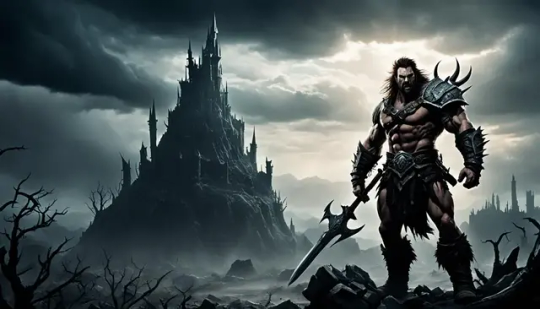
View On WordPress
#Sword and Sorcery Evolution#Fantasy Genre Development#Sword and Sorcery Origins#Popular Sword and Sorcery Authors#Evolution of Hero Archetypes#Sword and Sorcery Themes#Swords and Magic Evolution#Historical Fantasy Trends#Sword and Sorcery Subgenres#Impact of Sword and Sorcery in Pop Culture
1 note
·
View note
Text
she got this - op81

pairing: oscar piastri x academic!girlfriend
summary: oscar visits his girlfriends bachelor thesis defending
word count: 1.3k
face claim: phoebe bridgers
warnings: a swear word, some angst - mentions of a panic attack
note: this is for my baby @lissyontour, you got this, pls wish her good luck for today <3
oh and it’s my first oscar fic, hihi, enjoy it
and there is some of the bachelor thesis… i had to include some of it, thanks to chat gpt
masterlist / taglist
Fuck, was she nervous. Her head was spinning and her legs were jelly - no, scratch that - her legs were liquid.
Her eyes were trying to focus on something, just something that would help her back to reality. She knew she was somewhere else right now, somewhere where she shouldn’t be.
Why wasn’t Oscar with her? Why was she alone? This was not how she planned it!
Her heart was beating, she felt it nearly pop out of her chest. It almost hurt. Oscar should’ve been here with her, but a last minute meeting with Zak just threw her plans overboard.
Her breath quickend and her hands searched for the only safe thing she could think of, her phone. Her fingers quickly glided over the screen and Oscars answer made her hold her breath for a second.
Standing in front of the auditorium, the heavy red doors made her uneasy. It’s gonna be time soon.

Oscar had to hold himself back not to text her that he was actually sitting in the front row and waiting for her to enter the room. He knew it was cruel. But he just had to do it.
He was so much more nervous than her. He watched her write that bachelor thesis for over six months now. At every race she was sitting in his drivers room with at least ten books and her laptop. Only just for the last five laps she came out of the room to watch him race.
He appreciated her coming, she could’ve just stayed at home and studied, but she always came with. Multitasking her way through her studies. And he was so proud of her. There was no way he would miss her final step of the way.
And he knew his cruelty was all worth it, as she stepped into the room and her eyes spotted his. Her whole face lit up and he could almost spot some tears of relief.
„What are you doing here?“, she mouthed. A small smile on her lips. „Supporting you“, he mouthed back, matching her smile.
„Welcome Ms y/l/n!“, her professor welcomed her. „I am exited to hear you defend your bachelor thesis about; How Greek Mythology influenced modern literature.“
She smiled at her favourite teacher and took out her thesis. She closed her eyes for a second, breathed in and out again. She was ready. Oscar knew she studied English literature and oh did that make her sexy.
But he had no idea of Greek Mythology or modern literature by any means. Yes, he read her thesis at least twice, but did his brain understand anything she meant? It did not. Being the smart one was all her job.
„Welcome Professor McAllister, dear colleagues, guests and friends. I hereby welcome you dearly to my defending of my bachelor thesis: How Greek Mythology influenced modern literature.“
Oscar listened intently and always smiled when she looked at him for reassurance. His heart was swelling with proudness. He soon had a girlfriend with a bachelor degree.
„In the vast tapestry of literary evolution, Greek mythology stands as an enduring thread, weaving its timeless narratives into the very fabric of modern literature. As contemporary authors navigate the labyrinth of inspiration, they find themselves entwined with the rich tapestry of gods, heroes, and mythical creatures that originated in ancient Greece.
The resurgence of interest in Greek mythology can be traced to its profound impact on archetypal storytelling. From the lofty heights of Mount Olympus to the depths of the Underworld, these tales resonate with universal themes that transcend temporal and cultural boundaries. Authors draw from the exploits of Zeus, the sagas of heroes like Achilles, and the tragedies of figures like Oedipus to explore complex facets of human nature. The gods' capriciousness mirrors the unpredictable forces that shape our destinies, while the struggles of mortals against divine intervention echo the perennial human quest for agency in the face of cosmic uncertainty.
Prominent literary figures, from James Joyce to J.K. Rowling, have paid homage to Greek mythology, infusing their works with echoes of ancient narratives. The hero's journey, a concept rooted in the mythic structure of heroes like Perseus and Hercules, serves as a narrative template for protagonists in contemporary novels. These echoes are not mere nostalgic nods; they represent a perennial dialogue between past and present, a dialogue in which timeless themes find new expression.
Moreover, the enduring allure of Greek mythology lies in its malleability. Authors wield the myths as allegorical tools to explore issues ranging from power dynamics and hubris to the nuances of morality. The Hydra of Lerna becomes a metaphor for societal challenges that sprout anew when seemingly eradicated, and the labyrinthine trials of Theseus mirror the complexities of modern ethical dilemmas.
In essence, the enduring influence of Greek mythology on modern literature is a testament to the universality of its themes and the perennial resonance of its characters. As authors continue to delve into the wellspring of ancient tales, they discover not relics of a bygone era, but rather a living reservoir of inspiration that fuels the imagination of generations, perpetuating the eternal dance between the ancient and the contemporary.“
Her voice angelic as it could be, drew in people who never even heard of the topic. You didn’t have to be interested in Greek Mythology to listen to her thesis, because she delivered her speech that even Oscar understood and left him wanting to know more about it.
My god was he proud. He was in awe, his beautiful girlfriend standing up there, speaking about her passion and delivering it in a way he never thought she could.
Even the look on Professor McAllister made him proud. She looked at his girlfriend with a proud smile, nodding along with her and reassuring her. She was gonna ace this.
Oscar was snapped out of it when the whole auditorium clapped. She was standing with the biggest smile on that stage. Oscar just had to get a picture of her. His new wallpaper.
„Thank you, Ms y/l/n. This was magnificent! We‘ll just discuss real quick and we‘ll be back with your grade. You can be proud of yourself, Ms y/l/n“, Professor McAllister told the young woman on stage.
And as soon as they left the room, she squealed and ran to Oscar. He opened his arms and let the girl spring into his embrace. „Hi“, he whispered. „Hi“, she whispered back. „I thought you weren’t coming?“
He laughed, a real deep belly laugh. „I had to surprise you!“ She hit his shoulder and said: „I hate you, but I’m glad you came.“
„You did so well, my love. I am so proud of you! We have to celebrate afterwards, anything you want.“
The time together was cut short, when the door opened again and the four professors walked in again. „Ms y/l/n, please, have a seat“, her professor said and pointed to the chair sat in front of the four.
She nervously walked over to them and smiled at them. „No need to be nervous, you did well, you can be proud of yourself.“
They talked stuff Oscar didn’t understand. But when he saw a big smile form on her face, he knew she received the best grade she could’ve. Proud, that’s the only word that came to Oscar’s mind.
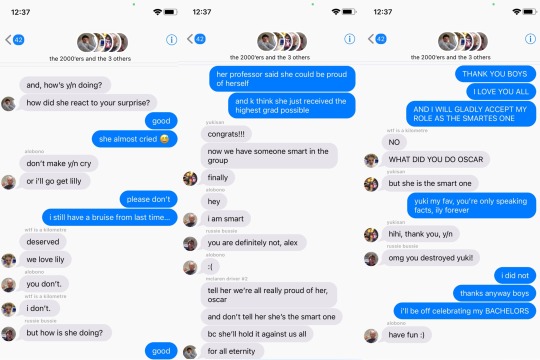
„I love the boys“, she told Oscar. He smiled up at her and said: „I know you do, but only I can celebrate with you today.“ She giggled and would’ve almost kicked her feet, if it weren’t for the others in the room.
Professor McAllister handed y/n her diploma and told her they’d see each other at official ceremony. After that, Oscar and his girlfriend almost sprinted out of the auditorium.
oscarpiastri
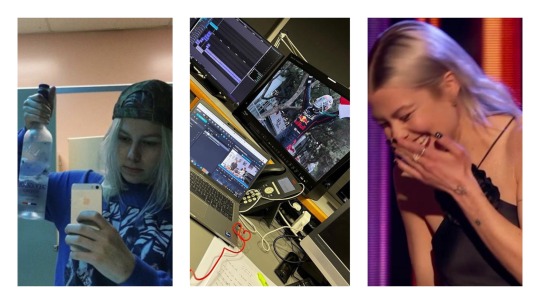
liked by yninsta, landonorris and 82‘729 others
oscarpiastri how did we get from that to this?
view all 22‘219 comments
yninsta the first one is NOT me, idk where you got this from
user1 weren’t we all at that point during our studies?
user2 yes, yes we were
yninsta glad i wasn’t alone…
oscarpiastri so it was you
yninsta oop-
landonorris congrats, y/n! when we gonna get a lecture about greek mythology from you?
yninsta any day you want
landonorris now?
oscarpiastri no, now she’s busy with me
landonorris ewww, my eyes are scarred, don’t ever come back to the mclaren garage
oscarpiastri i didn’t mean it that way
yninsta he did
landonorris you’re just kids
user3 we love an academic wag
user4 so proud of you, y/n!
mclaren congratulations, y/n, next podium is for you 🍾
yninsta thank you, admin
yninsta thank you, baby
oscarpiastri i am so proud of you, darling
loganseargant i cannot believe i have a friend with a bachelors degree…
yninsta better believe it, american boy
user4 do u even know what a bachelors degree is..?
user5 american slander, we love it
alex_albon we are all proud, y/n
user6 we really are
yninsta thank you all so much, i love you guys so much
georgerussel63 oh no, she’s getting sentimental, let’s stop here guys
°°°
@ironmaiden1313 , @topguncultleader , @biglittlesecret , @gulabjamooon , @lovelyy-moonlight , @peachyplumsss , @mistrose23 , @copper-boom , @love4lando , @champomiel , @serenityleah , @iloveyou3000morgan , @angelwithoutmywings , @elleeeee21 , @youkissedareaderinthedark , @mikauraur , @thybulleric , @lpab , @fdl305 , @mellowarcadefun , @teti-menchon0604 , @vildetry06 , @bibissparkles , @aurora-maria , @lunnnix , @sya-skies , @Buckywifeyy , @dakotali , @rechtrecht , @noncannonships , @1eclerc16 , @pitlanebabe , @sopheeg , @avengersheart , @thatsadsmallchild , @peachiicherries , @idkiwantchocolatee , @callsign-scully , @mehrmonga , @badbatch-simp24 , @lissyontour , @din0nugs , @elliegrey2803 , @gay-for-victoria-de-angelis , @10vely-yutazen , @daggersquadphantom , @azriel-the-shadowsinger , @i-love-scott-mccall , @darleneslane , @mikauraur , @heartmetaphor , @darleneslane , @ellswilliams , @thxtmarvelchick , @nataliambc , @dontjudgeabookbythecover , @hockeyboysarehot , @thehistoryone
#f1 x reader#formula 1#f1#oscar piastri x reader#oscar piastri#oscar piastri x female reader#lando norris#logan sargeant#alex albon#george russel#oscar piastri instagram au#yuki tsunoda
591 notes
·
View notes
Note
I would LOVE to read your analysis of louis as byronic hero as apposed to his reading as gothic heroine. lots of the latter and zero of the former in the fandom.
Sure! Mmm, okay, so –
What are we talking about when we talk about Gothic Heroes?
When we talk about gothic heroes, we’re really talking about three pretty different character archetypes. All three are vital to the genre, but some are more popular in certain subgenres i.e. your Prometheus Hero may be more common in gothic horror, whereas your Byronic Hero might be more likely to be found in gothic romance. That’s not to say they’re exclusive to those subgenres at all, and there is an argument that these archetypes themselves are gendered (in many ways, I think people confuse Anne being an author of the female gothic with Louis being a gothic heroine, but I’ll get into that later), but this is also not necessarily something that’s exclusive.
Anyway, I’m getting ahead of myself, haha, so the three gothic hero archetypes are:
Milton’s Satan who is the classic gothic hero-villain. You can probably guess from the name, but he was originated in John Milton’s 1667 poem, Paradise Lost. He is God’s favourite angel, but God is forced to cast him out of heaven when he rebels against him. As an archetype, he’s a man pretty much defined by his pride, vanity and self-love, usually fucks his way through whatever book or poem he’s in, has a perverted, incestuous family, and a desire to corrupt other people. He’s also defined as being “too weak to choose what is moral and right, and instead chooses what is pleasurable only to him” and his greatest character flaw, in spite of all The Horrors, is that he’s usually easily misguided or led astray. (I would argue that Lestat fits into this archetype pretty neatly, but that’s a whole other post.)
Prometheus who was established as a gothic archetype by Mary Shelley with Frankenstein in 1818. Your Prometheus Hero is basically represented by the quest for knowledge and the overreach of that quest to bring on unintended consequences. He’s tied, of course, to the Prometheus of Greek myth, so you can get elements of that in this character design too in that he can be devious or a trickster, but the most important part of him is that he is split between his extreme intelligence and his sense of rebellion, and that his sense of rebellion and boundary pushing overtakes his intelligence and basically leads to All The Gothic Horrors.
And the Byronic Hero, who as the name implies, was both created by and inspired by the romantic poet, Lord Byron in his semi-autobiographical poem, Childe Harold’s Pilgrimage which was published between 1812-1818. The archetype is kind of an idealized version of himself, and as historian and critic Lord Macaulay wrote, the character is “a man proud, moody, cynical, with defiance on his brow and misery in his heart, a scorner of his kind, implacable in revenge, yet capable of deep and strong affection.” Adding to that, he’s often called ‘the gloomy egoist’ as a protagonist type, hates society, is often self-destructive and lives either exiled or in a self-exile, and is a stalwart of gothic literature, but especially gothic romance. Interestingly too, in his most iconic depictions he’s often a) darkly featured and/or not white (Heathcliff being the most obvious example of this given Emily Bronte clearly writes him as either Black or South Asian), and b) is often used to explore queer identity, with Byron himself having been bisexual.
Okay, but what about the Gothic Heroine?
Gothic heroines are less delineated and have had more of an evolution over time, which makes sense, given women have consistently been the main audience of gothic literature and have frequently been the most influential writers of the genre too. The gothic genre sort of ‘officially’ started with Horace Walpole’s 1764 novel, The Castle of Otranto and Isabella is largely regarded as the first gothic heroine and the foundation of the archetype, and the book opens even with one of the key defining traits – an innocent, chaste woman without the protection of a family being pursued and persecuted by a man on the rampage.
The gothic heroine was, for years, defined by her lack of agency. She was innocent, chaste, beautiful, curious, plagued by tragedy and often, ultimately, tragic. Isabella survives in The Castle of Otranto, but she’s one of the lucky ones – Cathy dies in Wuthering Heights, Sybil dies in The Picture of Dorian Gray, Justine and Elizabeth both die in Frankenstein, Mina survives in Dracula, but Lucy doesn’t. There’s an argument frequently posited that the gothic genre was, and is, about dead women and the men who mourn them, and Interview with the Vampire certainly lends itself to that pretty neatly.
Of course, the genre has evolved, and in particular by the late 1800s, there was a notable shift in how the Gothic Heroine was depicted. The house became a place of imprisonment where they were further constrained and disempowered, she was infantilized and pathologized and diagnosed as hysterical, and as Avril Horner puts it in her excellent paper, Women, Power and Conflict: the Gothic heroine and ‘Chocolate-box Gothic’, gothic literature of this era “explores “the constraints enforced [by] a patriarchal society that is becoming increasingly nervous about the demands of the ‘New Woman’.”
This was an era where marriage was increasingly understood in feminist circles to be a civil death where women were further subjugated and became the property of their husbands. This was explored through gothic literature as the domestic space evolved into a symbol of patriarchal control in the Female Gothic.
Female Gothic vs Male Gothic
Because here’s the thing – the female gothic and the male gothic are generally understood to be two different subgenres of gothic literature.
While there are plenty of arguments as to what this entails, the basics is that the male gothic is written by men, and usually features graphic horror, rape and the masculine domination of women and often utilises the invasion of women’s spaces as a symbol of further penetrating their bodies, while the female gothic is written by women, and usually features graphic terror, as opposed to horror, while delving more specifically into gender politics. More than that though, its heroines are usually victimized, virginial and powerless while being pursued by villainous men.
The Female Gothic as a genre is also specifically interested in the passage from girlhood to female maturity, and does view the house as a place of entrapment, but she is usually suddenly “threatened with imprisonment in a castle or a great house under the control of a powerful male figure who gave her no chance to escape.”
That’s not Louis’ arc, that’s Claudia’s arc twice over, first with the house at Rue Royale, then with the Paris Coven, and Lestat and Armand aren’t the only powerful male figures who imprison her.
Claudia as the Gothic Heroine
Claudia in many ways is the absolute embodiment of the classic gothic heroine. Even the moment of their meeting is a product of Louis’ Byronic heroism – his act of implacable revenge against the Alderman Fenwick which prompts the rioting that almost kills her. She’s a victim of Louis’ monstrousness before they’ve even met, and while he saves her, he arguably does something worse in trapping her in the house with both himself and Lestat, holding her in an ever-virginal, ever-chaste eternal girlhood, playing into Lestat’s Milton-Satan by enhancing the perversion of family and ultimately infantilizing her out of his own desire for familial closeness.
Claudia has no family protection before Louis and Lestat – a staple of the gothic heroine – she is completely dependent on them in her actual girlhood, and again in adulthood, never developing the strength to be able to turn a companion, to say nothing about the sly lines here and there that further diminish and pathologise her (Lestat calling her histrionic, Louis making her out to be a burden, etc.). This is all further compounded again with the Coven, and when the tragedy of her life ultimately leads to the tragedy of her death.
Louis as the Byronic Hero
Not to start with a quote, but here’s one from The Literary Icon of the Byronic Hero and its Reincarnation in Emily Bronte’s Wuthering Heights:
“Generally speaking, the Byronic hero exhibits several particular characteristics. He does not possess heroic virtues in the usual, traditional sense. He is a well-educated, intelligent and sophisticated young man, sometimes a nobleman by birth, who at the same time manifests signs of rebellion against all fundamental values and moral codes of the society. Despite his obvious charm and attractiveness, the Byronic hero often shows a great deal of disrespect for any figure of authority. He was considered "the supreme embodiment [...] standing not only against a dehumanized system of labor but also against traditionally repressive religious, social, and familial institutions" (Moglen, 1976: 28).
The Byronic hero is usually a social outcast, a wanderer, or is in exile of some kind, one imposed upon him by some external forces or self-imposed. He also shows an obvious tendency to be arrogant, cunning, cynical, and unrepentant for his faults. He often indulges himself in self destructive activities that bring him to the point of nihilism resulting in his rebellion against life itself. He is hypersensitive, melancholic, introspective, emotionally conflicted, but at the same time mysterious, charismatic, seductive and sexually attractive.”
Louis as he exists in the show to me is pretty much all of those things, and I think to argue that he’s a gothic heroine not only diminishes Claudia’s arc, but robs Louis of his agency within his own story. Louis chooses Lestat, over and over again, he’s not imprisoned by the monster in the domestic sphere, he is one of the monsters who’s controlling the household, including making decisions of when they bring a child into it and when Lestat gets to live in it – he wanted to be turned, he wanted to live with Lestat in Rue Royale, and while there are certainly arguments to be made about their power dynamic within the household in the NOLA era, importantly Louis actually gained social power through his marriage to Lestat, particularly through The Azaelia, he didn’t lose it in the way that’s vital to the story of the gothic heroine.
Daniel Hart even said it in a recent twitter thread about Long Face, but there is an element of Lestat and Louis’ relationship that is transactional, and to me, for that to exist, they both have to have a degree of control over their circumstances and choices in order to negotiate those transactions. Claudia is the one who can’t, she’s the one who’s treated effectively as property, and she’s the one who lacks control over her circumstances.
While you could perhaps argue the constraints of the apartment in Dubai lend more to the gothic heroine archetype, I’d argue it as furthering the Byronic trope again by being representative both of Louis’ self-destruction and self-imposed exile. As Jacob has said a few times, Louis does seem to have known to a degree that Armand was involved in Claudia’s death on some level, and it’s that guilt and misery that has him allowing Armand his degree of control. The fact that Louis was able to leave Armand as easily and as definitively as he was I think demonstrates that distinction too – after all, to compare that ending to Claudia’s multiple attempts to leave the confines of the patriarchal house, both in Rue Royale and Paris, which were punished at every turn – first by her rape, then by Lestat dragging her back off the train, and then by the Coven orchestrating her murder.
Louis gets to leave because Louis can leave, he has both the social and narrative power to, and the fact that he does is, to me, completely at odds with the gothic heroine. Louis can, and does advocate for himself, Louis is proud, moody, cynical. Defiance is a key part of his character, just as his exile from NOLA society due to his race, and his chosen rejection of vampire society in Paris, is. He’s intelligent and sophisticated, travels the world, and has misery in his heart, guilt that eats him up, and self-destructive tendencies. That’s a Byronic Hero, baby!
#i also agree with jacob when he says he has a lot more power in his relationship with lestat than he'd admit to#i also think the house in rue royale is both constraining AND liberating for louis#as he's able to live with a sort of honesty he couldn't in his mother's house#lestat wields a lot of power in it of course but louis does too#i could keep talking about this but i think that's probably enough for this morning haha#louis de pointe du lac#amc interview with the vampire#iwtv asks#claudia de pointe du lac#welcome to my ama
126 notes
·
View notes
Text
spiritual notes: the path of the heart 💚
When exploring the intricacies of spiritual consciousness, one often encounters a labyrinth of interconnected themes, energies, and practices. At the center of this exploration lies the concept of living from the heart, a state of being that transcends the limitations of the ego-driven mind and aligns one with the universal force of love. This journey toward heart-based consciousness is not only a spiritual pursuit but also a practical approach to navigating life's challenges with grace and wisdom.
In the realm of spirituality, the mind often presents itself as an obstacle to living from the heart. It whispers doubts and fears, suggesting that focusing on love will detract from one's efficiency and practicality. However, as we delve deeper into the nature of heart-based living, we discover that the mind does not cease to function; rather, it operates under a new jurisdiction—the law of love. This concept of mind-heart coherence allows us to harness the intelligence of the heart while still engaging in daily tasks and responsibilities.
Living from the heart enables us to perceive reality through a different lens—one that is attuned to the energy behind words and actions. Instead of reacting defensively to criticism or grievances, we become adept at sensing the underlying desire for connection and intimacy. This heightened awareness fosters deeper understanding and empathy in our relationships, transforming conflicts into opportunities for growth and healing.
At the core of heart-based consciousness lies the recognition that love is the highest truth, the ultimate guiding force in the universe. This acknowledgment leads us on a path of devotion, a journey toward aligning ourselves with the divine essence of love. While this path may present challenges and resistance from the ego, it ultimately leads to a profound surrender to the power of love.
In various spiritual traditions and esoteric teachings, the concept of the heart is deeply intertwined with themes of devotion, transformation, and spiritual evolution. For example, in Christianity, the path of devotion mirrors the journey of Jesus Christ, who withdrew to the wilderness to commune with God and align himself with divine love. Similarly, in astrology, the Sun symbolizes our connection to our spiritual essence, representing the core of our being and our capacity to radiate love and light into the world.
The astrological sign of Leo, ruled by the Sun, embodies the qualities of courage, creativity, and generosity that are synonymous with heart-based consciousness. Leos are known for their strong vital energy and their ability to lead with warmth and kindness. Through their connection to the heart, Leos embody the archetype of the hero, bravely facing life's challenges with love and integrity.
As we journey through life, we are invited to cultivate the power of our cosmic heart, to embrace the light of our true essence, and to align ourselves with the universal force of love. This journey requires courage, dedication, and a willingness to surrender to the wisdom of the heart. Yet, in doing so, we discover a profound sense of fulfillment, purpose, and joy that transcends the limitations of the egoic mind.
follow for more astro insights like this and support me over on instagram @sensualnoire or yt @quenysefields
#spirituality#astrology#astro observations#astro notes#astro community#astrology observations#astro#black tumblr#gemini#mpls#black spirituality#spiritual awakening#spiritual healing#spiritual#spiritual awareness#spiritualism#spiritual disciplines#love#heart center#heart#love centered#sun#leo#chakra#heart chakra#astrologer#astrology readings#astrology signs#astro blog#astrology chart
67 notes
·
View notes
Text
Felt like sharing some speculation today:
All right, so we know My Hero Academia has the something of the same premise as X-Men in the sense that select a group of humans were suddenly born with powers, the whole 'evolution leaps forward’ deal.
We see in My Hero how the First Generation of people with Quirks, especially the ones who appeared non-human or semi non-human, were originally ostracized like the mutants of X-Men are, but then more people were born with powers and then more people had powers until it became a widespread phenomenon and ‘normal’ people became the minority and society had to restructure itself to accommodate the new normal.
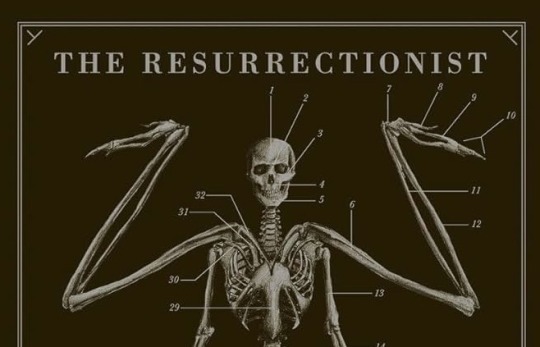
But have you read The Resurrectionist: The Lost Work of Dr. Spencer Black?
The plot is a 19th century doctor who theorizes that mythical creatures like the minotaur, harpies, sirens, and the like all existed millions of years ago but slowly interbred with humanity and eventually died out altogether. So he believed that when someone was born with extra fingers, limbs, a tail or otherwise didn’t have the typical human shape, it wasn’t so much a mistake in genetic coding as it was the extremely recessive genetics of those ancient creatures trying to reoccur in the modern day.
...
Definitely an interesting premise, so now I’m wondering if the My Hero world has a cult, conspiracy theorists, or even some scientists/historians that have similar views regarding mythology.
If this whole Quirk thing happened back in the Stone Age where no one had the benefit of science or awareness of DNA, anyone born with an otherworldly power would have been worshipped as a deity. Or the ones born with a non-human appearance would have been reviled as monsters.
So following the idea of The Resurrectionist, maybe the sudden appearance of superpowers did lead people to take a closer look at the old myths and consider the stories of the gods/goddesses of old were originally stories of people with 'Quirks' who rose to power. Humans with meta-powers ruled the world for a few centuries, then those powers inexplicably died off. For a variety of reasons or maybe unknown reasons, humanity lost that history but remembered the old stories and chalked them up to just myth until the powers that made it possible began to reappear full force several millennia later.
Some myths began as historical events but in being handed down hundreds of generations, the multiple tellings and retellings exaggerated them into the realm of impossibility.
Lightning/electricity powers: Zeus, Thor, Hinon
Fire powers: Hephaistos, Surtr, Hestia, the phoenix
Foresight: Any seer, prophet, or oracle that appears in any myth ever
Ice powers: Yuki-onna, Skadi, Morana
Water powers: Poseidon, Chalchiuhtlicue, Anuket, Tlaloc
Plant-related Quirks: Demeter
Gigantification Quirks: Giants, titans, nephilim
Ryukyu: Is a dragon. ‘nuff said.
All Might: Herakles
Tokoyami having a bird head but otherwise appearing human is pretty reminiscent of the old Egyptian gods.
Hawks: Any winged creature; take your pick. Personally, the one that comes to mind for me is Hermes. He only had wings on his sandals, sure, but the trickster archetype resonates.
Tsuyu: Naiads, nymphs, rusalki, any kind of water fae
Momo: Sedna (created sea life from her finger bones), Ukemochi no Kami (produces food from her own body)
Best Jeanist: This one's a bit of a reach, but the fabric thread thing coupled with the long, spider-like limbs kinda brings to mind the story of Arachne the weaver.
We do get a nod to Ancient Greek mythology with the prison Tartarus. What better place to lock away beings with god-like powers than the prison of the Titans itself?
Obviously an incomplete list, but you see my point.
Personally, I'm leaning toward cultist ideology with this one as I find it hard to believe every civilization would have forgotten about a previous appearance of Quirks. But civilizations die off, civilizations are overrun by others and their histories are suppressed, maybe this hypothetical 'previous Quirk phenomenon' wasn't as widespread as the current one and so fewer people were affected and therefore fewer people were alive to verify the truth of facts, maybe this hypothetical time was from an age of oral history and nothing was documented properly, so not impossible just really, really improbable.
Still, I love mythology and I find it an interesting headcanon to think about.
#my hero academia#the resurrectionist#hawks#fumikage tokoyami#keigo takami#ryukyu#mythology#folklore#bnha#mha#boku no hero academia#headcanons#quirks#all might#yagi toshinori#tsuyu asui#momo yaoyorozu#denki kaminari#tartarus#best jeanist#dabi#endeavor#shouto todoroki#heteromorphs
49 notes
·
View notes
Text
Trails of Love Hori's been paving down in the build up for the series' ending
Part II: Decoding the love story being told through other characters
Part One | II. Compress | Part Two -> KiriMina
.•° ✿ 2. Gentle & La Brava ೋღ

Gentle and La Brava are classic portrayals of the archetype known in Japan as "baka couple" - a couple that dotes on each other and are very openly affectionate. By juxtaposing the baka couple with Izuku and Katsuki, who keep their true feelings for each other close to their chests, Horikoshi is highlighting the tension and ambiguity going on between bkdk even more.
This tale is the evolution of my feelings towards Gentle/La Brava.
Their introduction was, very... unexpected. Izuku had just finished his tough fight against Overhaul. Nothing much was going on at the time and it had been quite a while since Izuku and Katsuki had interacted with each other.
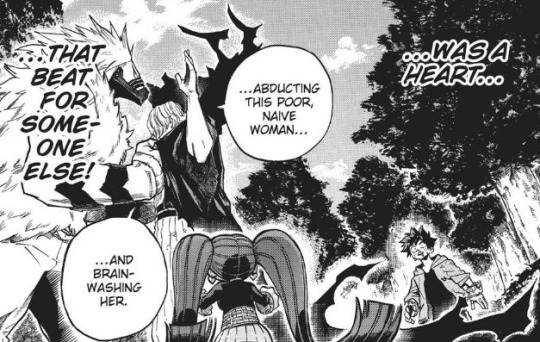
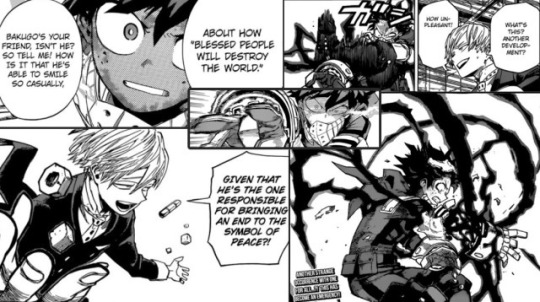
Shortly after Gentle and La Brava's introduction to the series, BkDk development ramps up and Izuku's "Control your heart" character arc begins. Isn't that interesting..?
The very first time I watched Gentle/La Brava's story in Season Four, something seemed so... misplaced about them.
Their vibe felt filler-ish and because of the school festival side plot going on, their appearance was more like a filler inside of a filler. Yet, Horikoshi had indeed written them into BNHA. These two characters felt so strange when compared with Hori's usual characters. Even downright silly. They were criminals, but they weren't even that bad..? Tea? U.A? They loved each other?
I just couldn't quite work out their purpose in the grand scheme of things and I quickly gave up trying to.
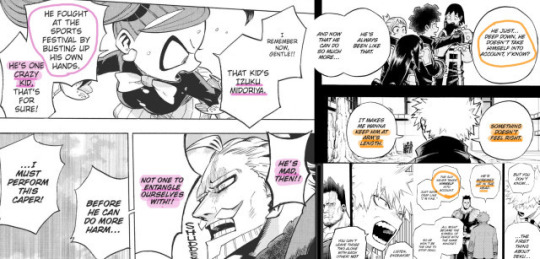
Izuku has no regard for himself? He's crazy? Don't get entangled with him? These lines scream out KATSUKI KATSUKI KATSUKI and how he had felt towards Izuku for years. It seems Hori projected Katsuki's issues with Izuku onto LB/G over 100 chapters before Katsuki verbalised them himself. Going back, now knowing they were written for BkDk is a new experience in and of itself.
Around the time of Katsuki's death, a few theories were floating around on twitter, saying that Gentle and La Brava were put in the manga to highlight what's going on with BkDk. At the time of hearing these theories, I never expected they'd be making a return to the story in the final arc, it had broke my brain thinking about them the first time, so I didn't give this theory too much thought... but when they showed up a second time, in the final act, I really wish I had.
Because as I was reading the things they were now saying the second time around, and being more open to this theory about them, all I could see in my head were visions of everything Izuku and Katsuki had ever done for each other. It had finally clicked:
God, Hori did invent these characters to be the voice of BkDk.
These were the new lines in question that sent my head spiralling about the magnificent truth of this theory:
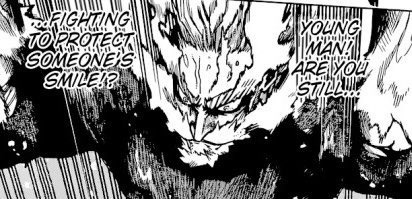
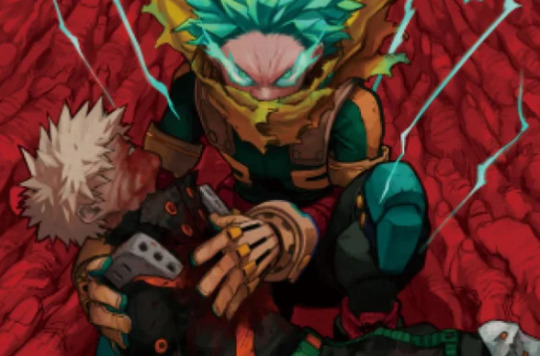
"Are you still fighting to protect someone's smile?!" It made me think of Katsuki, how Izuku was fighting for Katsuki's sake! To keep him safe, so he'll come back to him, energetic, alive, red eyes shining again with the passion that Izuku loves so much, and his face brimming with confidence and that wonderful, infectious smile of his that tells, no, shouts to everyone that he knows he's a winner.
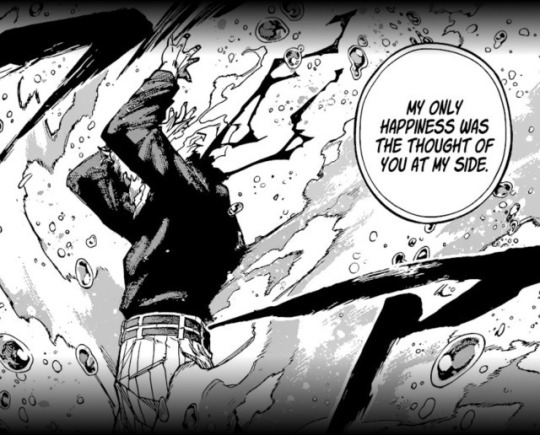
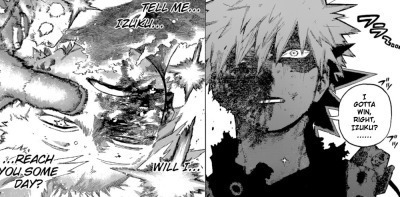
"My only happiness was the thought of you at my side" Immediately made me think of Katsuki's last moments and thinking of Izuku when he knew, he just KNEW he was going to die. And his thoughts of Izuku - wanting to be the hero that Izuku loves, so he could feel that love when he needed it most, these feelings surrounded and filled his entire heart like a comforting, soft, warm blanket. These feelings are what got him through everything until the end.
This one made me cry because Izuku was his happiness at his very end. And I finally saw Horikoshi, the mangaka who cares about BkDk more than anyone! I saw what he was doing!


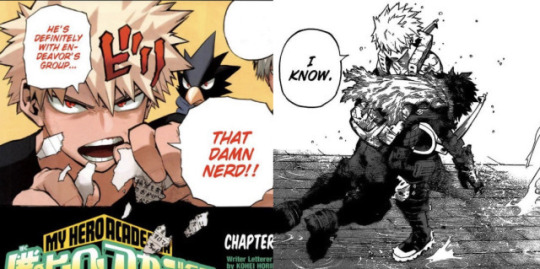
"The time we spent apart made our love even stronger." was like a ray of hope for me because every time they had a separation, BkDk's love grew even stronger. It meant that this separation caused by Kacchan's death would some day have an end too, where afterwards, they would be free to love each other for all the world to see.
Can you see it? Katsuki and Izuku were always meant to end up together, and La Brava and Gentle were meant to help show readers what they feel, without BkDk necessarily saying it themselves.


If Izuku's love of Kacchan is what got him a power up every time (OFA, Black Whip, Danger Sense), then this ultimate power of La Brava's must be the same for Katsuki too. Because it is his love for Izuku that gave him a quirk awakening. (And there's another great theory that their deep bond and immense love for each other is what connected Katsuki to Izuku's OFA, as well. So Gentle La Brava are connected via Love... and Katsuki and Izuku are connected via love!)
Let's say from the very beginning of BNHA, Horikoshi's idea was to gradually bring BkDk closer and closer, adding in little details here and there that don't make much sense on their own and are never expanded upon. Because he couldn't make their feelings known in the early/mid game... but he wanted to have them romance-ready at the end game.
Hori would have had a basic outline for the ways he was going to develop BkDk's relationship and he knew he needed a lot of 3rd party help to really spell out their relation to each other in the future. So Hori created Gentle and La Brava for this singular purpose. They exist to help verbalise Katsuki and Izuku's unsaid feelings! It's a perfect marriage between Gentle/La Brava's words and BkDk's actions.
And once people realised that Hori was doing this, they could then go back to the dialogues and connect the dots with other BkDk scenes as well, for example, Katsuki's abduction by the LOV in season three.

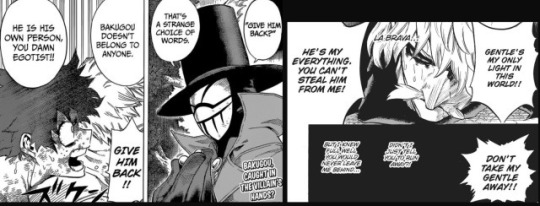
In a scene where Katsuki is taken away, Izuku's emotional pain is palpable. His deafening scream shocks not only his classmates, but a lot of viewers too. Because of his deeply emotional reaction and later scenes displaying symptoms of PTSD, this seemingly one-sided affection that Izuku has towards Katsuki, raised so many questions about their relationship for me. And as the series progressed, the mystery of Izuku's powerful feelings and need for Katsuki only deepened further. It feels like La Brava's dialogues were written into the series, just to verbalise what these overwhelming moments were truly like for Izuku.
This can't be just a coincidence. There are just too many parallels between BkDk and Gentle/La Brava to even count.
If you've read my twitter thread on the Gentle/La Brava vs BkDk parallels and how incredibly similar Izuku and La Brava's backgrounds are, but you're still sceptical about this theory, then going on this journey of Hori's trails with me may help convince you that Hori was going to make BkDk canon no matter what and that he's been using other characters to narrate the feelings of BkDk's actions.
In the future, I hope to show you how instrumental Gentle and La Brava were in expressing Horikoshi's vision.
Because there are more layers to Gentle and La Brava's arc than a damn rainbow cake. And I'm still not finished with these two yet, but that is a topic for a later post. Next up, KiriMina!
Part Two -> KiriMina
II. Compress
Back to Part One
#bakudeku#bkdk canon#kana writes#bnha meta#op#must read meta#gentle love#what do you guys think about gentle and la brava?
207 notes
·
View notes
Text
Trope chats: Femme fatales and damsels in distress

The tropes of femme fatales and damsels in distress have been enduring elements in literature, reflecting and shaping societal attitudes towards gender roles and expectations. These archetypes, while seemingly polar opposites, share a complex relationship that transcends the surface narrative. In this essay, we will delve into the origins, appeals, evolutions, comparisons, and societal impact of these archetypal characters, exploring how they mirror and influence the societies that create and consume them.
The femme fatale archetype emerged in early 20th-century literature, embodying a seductive and dangerous woman who uses her charm to manipulate men. This archetype taps into societal fears of female empowerment, challenging traditional gender norms. The allure of the femme fatale lies in her ability to wield her sexuality as a weapon, destabilizing the male protagonist's control and agency.
On the other hand, the damsel in distress archetype dates back centuries, portraying women as helpless and in need of rescue. This trope capitalizes on the societal ideal of women as delicate and dependent, reinforcing traditional gender roles. The appeal of the damsel in distress lies in the hero's journey, where the male protagonist's valor is showcased through his ability to save and protect the vulnerable female character.
Over time, both archetypes have evolved, reflecting changing societal attitudes towards gender. The femme fatale has morphed from a one-dimensional seductress to a multidimensional character with agency, complexity, and sometimes sympathetic motives. Writers began subverting the trope, providing femme fatales with backstories and motivations that challenge simplistic notions of good and evil.
Similarly, the damsel in distress has undergone transformation, with modern literature introducing empowered and resilient female characters who actively participate in their own rescue. This evolution reflects a shift in societal expectations, acknowledging that women can be both strong and vulnerable, active participants in their destinies.
The femme fatale and damsel in distress serve as contrasting symbols, representing opposing views of female agency and vulnerability. While the femme fatale challenges patriarchal norms by using her power, the damsel in distress reinforces traditional gender roles by embodying vulnerability. These archetypes exist on a spectrum, with characters often incorporating elements of both, highlighting the complexity of female representation in literature.
Literature has the power to shape and reflect societal attitudes. The portrayal of femme fatales and damsels in distress can perpetuate or challenge gender stereotypes, influencing how readers perceive and internalize these roles. The evolution of these archetypes mirrors societal progress, showcasing a dynamic interplay between literature and cultural shifts.
Moreover, these archetypes have real-world consequences, contributing to and perpetuating gender inequalities. The repeated exposure to stereotypical portrayals of women in literature can reinforce harmful societal norms and expectations, impacting how women are perceived and treated in everyday life.
The tropes of femme fatales and damsels in distress offer a rich tapestry for exploring the intricate dynamics of gender in literature. As these archetypes continue to evolve, writers have the opportunity to challenge and reshape societal attitudes towards gender roles. By critically examining the appeals, evolutions, comparisons, and societal impact of these characters, we gain insight into the complex interplay between literature and the cultural narratives that shape our understanding of gender.
#writeblr#writers of tumblr#writing#bookish#booklr#fantasy books#creative writing#book blog#ya fantasy books#ya books#wr#writing community#teen writer#tumblr writers#writblr#writer problems#writerblr#writers#writers community#writers corner#writers on tumblr#writerscommunity#writerslife#writing blog#book review#bookworm#book recommendations#booklovers#books and reading#books
20 notes
·
View notes
Text
@fishyfishyfishtimes, I noticed you like mermaids and enjoyed my fish Digimon post, so you may be interested in mermaid Digimon.
The OG is Mermaimon and I really like that she's (I'm saying she but whether or not Digimon have genders depends on which setting is being used) also a pirate. The lore says she uses her beautiful singing voice to lure people in and rob them. She also carries an anchor as a weapon and is not afraid to give someone a thrashing.
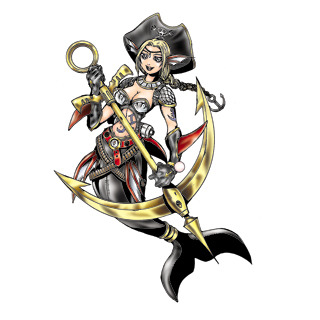
Mermaimon is the OG mermaid in the sense that she debuted first, but in lore the OG is AncientMermaimon. She is one of the Warrior 10, a group of ancient Digimon from the beginning of the Digital World. The Warrior 10 are dead, having long ago died to stop Lucemon (as in Lucifer) from destroying the Digital World. While the Warrior 10 are long dead, their data went onto spawn many species of other Digimon. AncientMermaimon specifically is the ancestor of all aquatic Digimon. She was effectively a goddess of the sea, able to control the weather and with enough power to sink entire islands. While I like the original Mermaimon's design more for its pirate theme, AncientMermaimon also has a great design.

The only merman in Digimon is Neptunemon. As the name suggests, he is based on the Neptune, roman god of the sea. He is also part of a group, the Olympos XII, who are also based on the Olympian gods. They collectively rule a portion of the Digital World that is on a private server called Iliad. He is the absolute ruler of the oceans on the Iliad server. I really like his samurai-inspired armor and the trident made of shark heads.
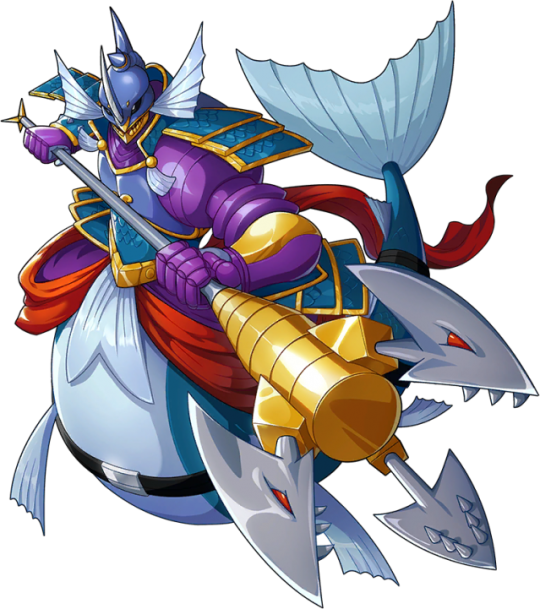
While that's all the proper mermaids, I have some honorable mentions in that they still fill the aquatic creature/girl archetype. The first is Ranamon, who has a direct connection to AncientMermaimon from above. In the anime Digimon Frontier, which introduced the Warrior 10, it is established that their spirits, each representative of an element, survived their death and can be taken up and used by others. While half the spirits are taken by the heroes, the other half are corrupted into evil. The good spirits are fire, light, ice, wind, and thunder while the corrupted spirits are steel, water, wood, earth, and darkness (later redeemed). Ranamon and her evolution are the corrupted spirit of water. The only spirit that we saw both the pure and corrupted versions of was darkness and I think that's a big missed opportunity. Ranamon is easily my favorite of the spirits, which is largely due to the english dub making her a classic mean girl with a southern accent. Her name comes from the Spanish word for frog.

Ranamon's evolution is Calamaramon, who is deliberately designed to be a darker version of a mermaid. Instead of a fish tail, she has an entire upside-down squid for a lower body. She's also supposed to be a sea witch and has a major temper. Oddly enough, she's one of the only spirt Digimon from Frontier that has shown up in other series. In the Digimon Adventure reboot she shows up as a major threat and in Digimon Ghost Game she's a monster of the week that's only a villain due to a misunderstanding. In approve given her role in Frontier basically boiled down to a joke about her being uglier than Ranamon.
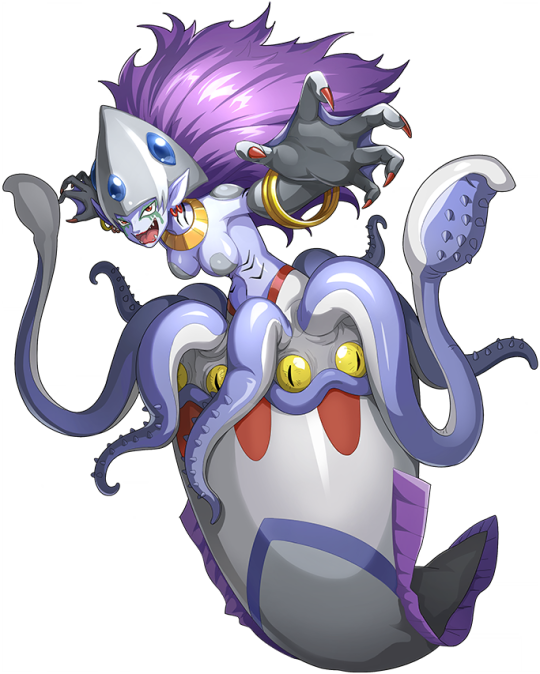
Last of the honorable mentions is the entire Jellymon evolution line: Jellymon to TeslaJellymon to Thetismon, to Amphimon. They're pretty recent recent Digimon, having been designed for the most recent anime, Digimon Ghost Game, where she's one of the main characters. She is also easily the biggest little shit in the franchise. I really like the jellyfish meets human design of the line. I also suspect Amphimon wearing a full-body dive suit is a deliberate subversion of the trend of feminine Digimon having sexy designs.

Jellymon

TeslaJellymon
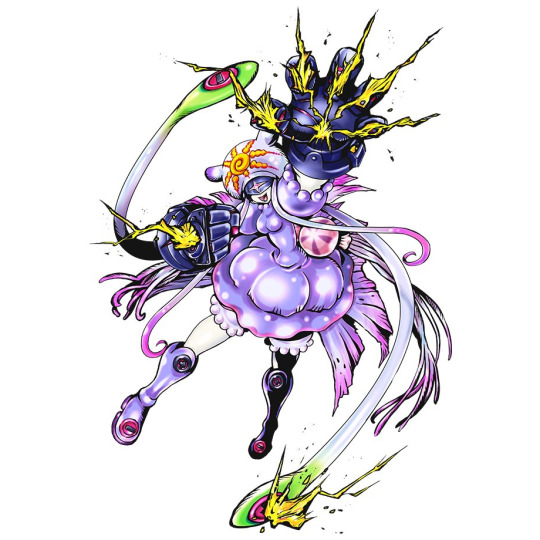
Testismon
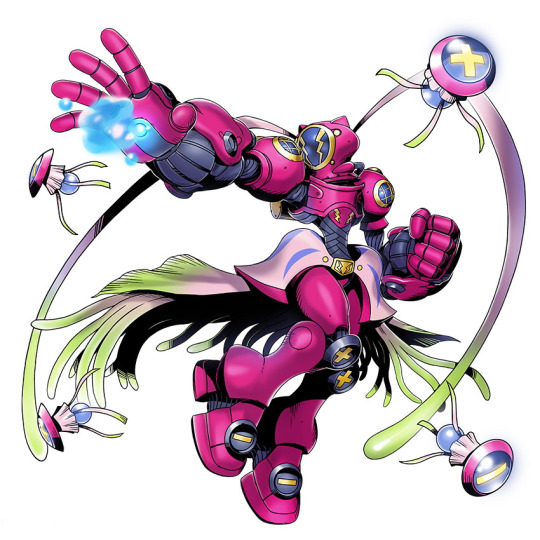
Amphimon
#Digimon#mermaid#mermaid digimon#mermaimon#ancientmermaimon#neptunemon#ranamon#calamaramon#jellymon#teslajellymon#thestismon#amphimon
98 notes
·
View notes
Text
youtube
Never really done any meta writing on Aphrodite before or posted anything on here with Alexandra’s commentary in it but just so you guys know,… she’s also one of my favourite characters in Xena too. Some standout statements from Alexandra about Aphrodite and her relationships with Xena, Gabrielle and Ares come from the Mythology vs Xena featurette that was on the 10th Anniversary Anchor Bay released DVD set. I think you guys will enjoy learning all about the great significance of Aphrodite’s character in the show directly expressed by the actress that portrays her.
“I think people will be watching this TV show for a long time. I think it’s one of those moments in television history that’s really important because of what I said earlier about it’s really the first time that I can think of where you have two women who are really strong women action heroes who aren’t answering to men in some way or other or being dictated to.”
“I don’t think Aphrodite is homophobic. If you want to interpret the show that Xena and Gabrielle were lovers, Aphrodite was a complete cheerleader of their relationship, I think. It’s a big deal. It’s the first time that I can remember that a television show has had such a place for the lesbian community. I think that’s a really big deal too. And so to have this pink fluffy blonde bimbo-y girl is a little bit incongruous but I think there’s a little bit of genius in that because what you don’t expect in a show that’s kind of becoming a feminist icon is sex and humour and that’s what Aphrodite was and everybody likes sex and humour. Including feminists and lesbians. It’s kind of an overlooked part of life sometimes when people get very serious. So I think that maybe that’s one of the reasons she worked so well on the show and people loved her so much.”
“Surprisingly in some ways, the most pivotal episode for Aphrodite’s evolution in the show was ‘Punch Lines’ - which was almost an afterthought. They had already shot the show. I was done filming another episode and they asked me at the last minute ‘can you stay for a few more days and shoot a few more scenes we’re gonna put into ‘Punch Lines’’? ‘Punch Lines’ was a bottle show. It was really about Gabrielle. A story about Gabrielle and Lachrymose. And then they decided they needed a little bit of funny in there so they put in Aphrodite. But, again, here’s an episode basically with me and Renee. And that’s when Aphrodite gets into the hot tub. That’s when Aphrodite psychoanalyzes Gabrielle and there’s that slightly famous line about… what was it? Some possible repressed impulses - or something like that that became such a famous sort of fun fan line. Again, you’re gonna have to ask the fans what my line was. But I think that’s sort of the moment when Aphrodite got in there with Gabrielle and they created their own connection and their own friendship and relationship and Aphrodite started to take a personal interest in Gabrielle specifically and the love between Gabrielle and Xena.”
“We talk about Aphrodite and Ares and the Gods as if they’re human beings but they’re not, actually. They’re Gods. I think of them as archetypal human impulses. So in some ways you can look at the episode ‘Motherhood’ - the Twilight of the Gods - as this family crisis were Aphrodite is going against her family. Making a choice to betray her family in order to stand up for her friend - who she thinks is innocent, who pretty much is - Gabrielle. In another way you can look at it as all these different forces playing against each other and - of course Aphrodite, she is love, she is the embodiment of love, all kinds of love but certainly also magnanimous love, generous love, redemptive love. So she kind of has no choice but to stick up for Gabrielle. She can’t really… Ares would of course go try to kill her because he’s the God of War, but Aphrodite is the God of Love. She can’t. I think even if she didn’t already have this relationship she would have stuck up for her … nnngh might not be right about that, but certainly since she already had this connection, she had no choice. She had to fight for her, I think.”
I will leave you guys with this Xena confessions that perfectly describes the way I personally interpret both Aphrodite and Ares and the profound influence they have on our beloved WLW ship in Xena and Gabrielle.
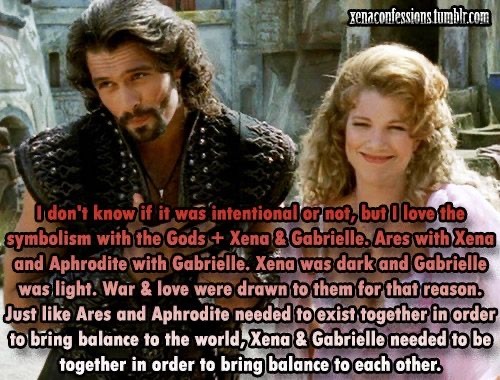
#xena warrior princess#aphrodite#goddess of love#alexandra tydings#mythology vs xena#commentary#key relationships#gabrielle and aphrodite#aphrodite and ares#Youtube
19 notes
·
View notes
Note
https://www.tumblr.com/bestworstcase/740971489166311424/httpswwwtumblrcombestworstcase74032567622112
it's the resistance to imagining any ending that does not simply replicate a system that is catastrophically failing right before our eyes and also would not have any reason to exist
I can't speak for everyone, but I think there's a strong aversion to discomfort present in this kind of mentality. There's a lot of lipservice to the notion of change and evolution and revolution, but a lot of fandom and people in general are VERY averse to anything, even storytelling, that doesn't ultimately result in something that they feel is comforting to their points of view or desires.
It's why people keep throwing fits about certain characters not doing things a certain way or according to certain archetypes. It's why certain plot points make people froth in the mouth or outright get it completely wrong.
They don't really seem to care all that much about story as a narrative or as a means to convey complex themes and messages that might be genuinely thought-provoking and uncomfortable, so much as they view stories as an extension of their own comfort zone, even at the expense of the story itself.
i mean. maybe. online culture is very inclined to treat discomfort as a Bad Thing that should be shunned (& in extremes, something people should be protected from feeling at any cost, which is part of what drives the pearl-clutching hays code 2! types).
but i think it's a lot more that:
fandom, being oriented around transformative engagement, is invested in the text primarily as a sandbox; the pervasive cultural attitude toward the text is that things you don't like can be discarded and the rest raided for spare parts. any space whose ethos is "fuck canon!" is going to disincentivize serious analysis of the text in favor of the creation of fanon—which is always homogenized and reduced to tropes because it's an accumulation of popular ideas, i.e. the organic crowdsourced cousin of corporate sanitization for mass appeal.
many fans do not differentiate clearly between canon and fanon to the point that there exists confusion between analysis (interpretation of the text) and headcanon (things held to be true irrespective of the text), which are in fact diametrically opposed and don't meaningfully overlap; consequently fanon is widely conflated with canon in addition to being prioritized.
fanon is shaped by cultural biases within the fandom which generally means "riddled with prejudice and stereotypes" and in rwby's case in particular means "sexist"—the story BEGINS with a fairly overt condemnation of the huntsmen system ("so you may prepare your guardians, build your monuments to a so-called 'free' world, but take heed: there will be no victory in strength"), and at the end of the first act a character gives a speech laying out it in even clearer terms. i do not think it's coincidental that the fandom that twists itself into pretzels to interpret salem and cinder in the harshest possible light is also the fandom that absolutely refuses to consider the possibility that these two characters Have A Point about the huntsmen system, actually.
most stories do not radically alter the narrative status quo. (this is true even of revolutionary narratives—the unjust system present at the beginning of the story will be overturned, yes, but more often than not the characters recognize the injustice from the beginning and at most learn that it's worse than they thought.) most stories do not slowly and inexorably build up to "the heroes are good, but the villain is right, and everyone needs to pull together to fix what is broken" as the climactic resolution. i cannot emphasize enough how unusual rwby is in what it's doing with salem, and the build up has been gradual enough—stretched over literally a decade!—that for longtime fans in particular, it's easy to overlook. fanon fills in the gaps with tropes, the complete monster who cannot comprehend good, the tarnished mentor nevertheless trying his best to do the right thing, the plucky heroes who fulfill his ideals in earnest, and later developments are interpreted through the lens of fanon.
to an extent it's a feature, not a bug: tropes over text is just what fandom is. it's just a lot more noticeable with rwby because a) rwby is an unusual story that does not lend itself easily to fanonification, and b) "the huntsmen system is broken and will fail" is an idea introduced into the narrative by two female villains who have been wronged by that system and the man who built it, so naturally the fandom dismisses it out of hand.
22 notes
·
View notes
Text
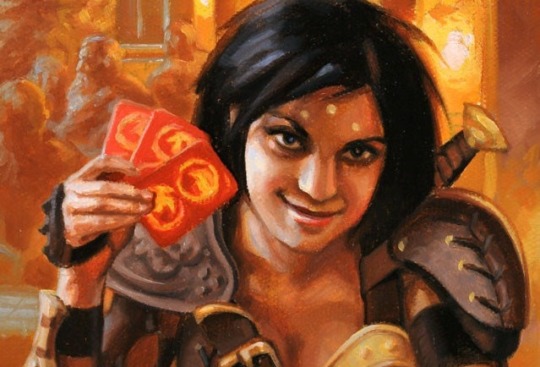
Masterposts
How to Rogue: a D&D 5e Masterpost
D&D 5e: Roguish Archetypes Masterpost Part I & Part II
Building a Rogue in 3.5 and Pathfinder: Collected Resources
Rogues in Fantasy Literature Masterpost
Dagger Fighting Masterpost
Thieves’ Cant Masterpost
Lock Picking Masterpost
Traps Masterpost
Tags and Credits
Basic Tags
How to Rogue: Exploring the Rogue class in D&D and assorted roleplaying games. Includes #fluff (roleplaying tips, character concepts, #backstories), #crunch (optimisation tips, guides, #magic items, #homebrew), and memes.
Rogues in Fiction: Exploring the Rogue archetype in literature, folklore, poetry, comics, games, etc, and #analysis thereof. Also relevant art.
Rogues in Theory: Exploring the Rogue archetype in history and society, and relevant subjects. Also #words of the trade (#etymology, synonyms, #thieves’ cant, linguistics).
Rogues in Practice: Tips on #how to stab and #how to steal (or, ahem, how to write/roleplay about stabbing and stealing), #exemplars of the trade (real life rogues and their exploits), and some less exemplary exploits. See also our esteemed colleagues in the #animal kingdom.
Art - Rogues Gallery: Rogue character portraits.
Art - Scene: Landscapes, fight scenes, #bar brawls, #heists, dungeon-crawling, etc. For urban landscapes, see #the city speaks.
Thieves’ Tools: Lockpicks! And assorted tools for breaking and entering where you’re not supposed to.
Tools of the Trade: Weapons! Mostly knives and daggers from all over the world (see the Dagger Fighting Masterpost for all the relevant tags), and some pretty swords and crossbows and the like.
Prison Ballads: The soundtrack.
…There is some overlap.
Quirky Thematic Tags
The ecstasy of gold: For loot, treasure, gold, and the deadly sin of greed.
The city speaks: For the hidden splendour of the city, from the gutters to the rooftops.
Heroes and villains: For good and evil and that grey waste in between which Rogues so often populate.
The phantom of liberty: For freedom, and storming the gates of heaven.
No tears for the creatures of the night: For the deadly sin of lust and its professionals.
The gambler’s face cracks into a grin: For gamblers and card cheats.
Dishonour on your cow: For honour among thieves, criminal codes, omertà, and blood feuds. File under the deadly sin of pride.
Fearlessly fleeing: For craven rogues and clever rogues. Wait, there’s a difference?
The ramblin’ rover: For vagrants and vagabonds and for the long-winding road.
The right to be lazy: For the deadly sin of sloth.
The hired man: For (mostly against tbh) the Rogue’s nemesis, the cop. See also #prison.
Swinging from the gallows tree: For the ignominious end that awaits us.
The quirk is strong with this one: See also #the potatoes of defiance, #big thief little thief, #the thrill of the heist, #the rich remember, #daring escape, #be the chaos you want to see in this world, #carnival, #stabbity, #only knives left, #dubito ergo sum, #fuck the king, #profanity makes everything better, #information wants to be free, #a begging I will go, #forbidden fruit, #the groaning rogue, #I fought the law, #the deserter. (#Tag namer explains some of the quirkiness.)
More Tags
Tabletop tales: It happened in somebody’s game.
D&D history: The conceptual and mechanical evolution of the Thief Rogue class in D&D, and other interesting stuff from the history of #roleplaying.
TRS: The Rogue speaks. Not to be confused with TSR.
Self explanatory: #D&D, #3.0, #3.5, #5e, #Pathfinder, #Pathfinder 2e, #AD&D, #roguish archetype, #feat, #skill trick, various #skills (#deception, #sleight of hand, #stealth, etc), #rogue fashion, #correspondence, #long post.
For anything else, try the search function and hope, but don’t get your hopes up because tumblr’s search function is appalling. Googling with the parametre site:theoutcastrogue.tumblr.com might actually be better.
Credits
All original work published here (i.e. the words and the occasional photograph of @theoutcastrogue aka @we-are-rogue, 2016–2023) is licenced under a Creative Commons Attribution-NonCommercial-ShareAlike 4.0 International Licence.
Avatar image: “Tymora’s Luck” (detail) by Ryan Pancost, from Dragon Magazine #388 | Wizards of the Coast 2010
Header image: “The Thief” (detail) by capprotti, for the game Exile Gods | Distant Orbit 2009
The WeAreAdventurers collective was started in 2016 by @wearepaladin.
See also the archival blog @wewererogue.
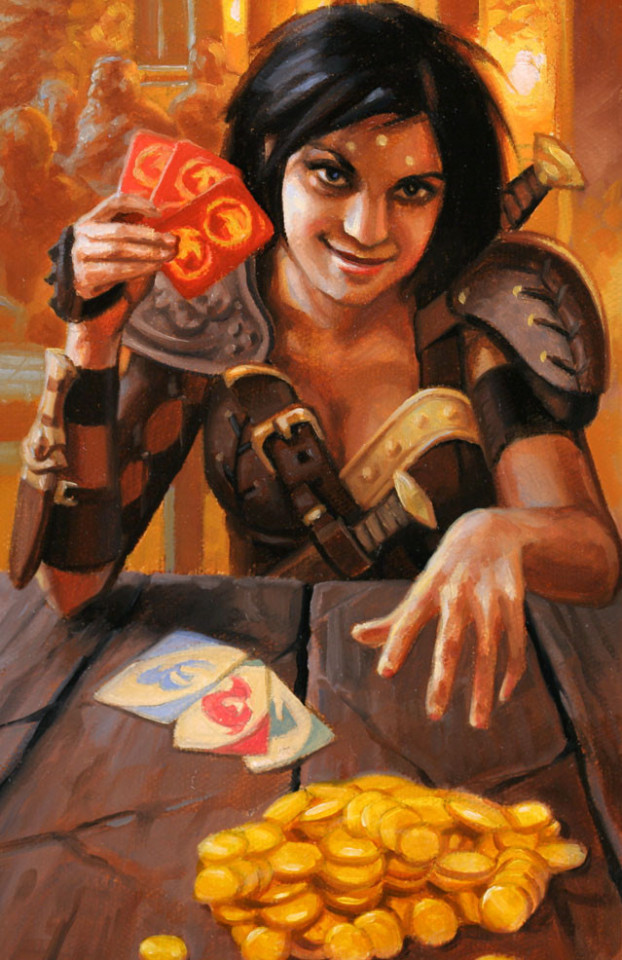
88 notes
·
View notes
Text
“I take it as a rule of nature that all American high schools are ruled by a pack of snobs, led by a supremely confident young woman who is blonde, superficial, catty, and ripe for public humiliation. This character is followed by two friends who worship her and are a little bit shorter." - American film critic Roger Ebert
“What do I get out of being friends with losers. I give them a piece of a winner and they stain me with loserness… You wanted to become a member of the most powerful clique in this school. If I wasn’t already the head of it, I’d want the same thing.” - Heather Chandler
mothers and fuckers of the jury, i come before you to speak on the topic of what it means to be a mean girl. i would like to speak of evildoing, malevolence, and misdeeds. why are we, as a society so fascinated by people who do bad things? perhaps it is our own incapacity for truly heinous acts that leads us to idolize pop culture villains, anti-heroes, and bad guys.
misty quigley is a great example of a character that’s dearly beloved by nearly everyone who watches yellowjackets even as she continues to commit worse atrocities in every episode. although misty quigley is an evil female character, she is not a mean girl. because misty shows us that in her own fucked up way, she does the things she does because she cares. she thinks she’s protecting ben by forcing him to depend on her, and the hidden camera she put in nat’s hotel room let her save nat from relapsing, so the spying is totally justified!
the mean girl, as an archetypal character, is a teenage girl who does terrible things because she fucking can. she doesn’t need any excuses or sad backstory or justifications for her actions. when inflicting misery on others, she’s unrepentant and unapologetic. all shall love her and despair.
now that we’ve established a working definition for the Mean Girl as a character, i’d like establish the chronological evolution of the archetype, and how heather chandler significantly impacted that development. although there are earlier incarnations of the Mean Girl, such as chris hargensen from carrie or betty rizzo from grease, i argue that heather chandler is the prototypal Mean Girl, spawning countless imitators for decades to come. her dna is evident in every other character in the archetype, both before and after her. additionally, heathers is probably the earliest media (or at least the earliest example i know of) to deploy the trope of the ruling triumvirate, repeated and paid homage by future iconic trios like the plastics and glee’s unholy trinity.
there are several arguments to be made against heather chandler’s status as the most iconic mean girl. but one of the most common and the one i want to address here is that she’s not even an important character since she only nets 30-35 minutes of screentime total, and dies in the first act without pulling off any truly ~evil~ misdeeds like jennifer’s cannibalism. to that, i say that though that may be true, that death is also the coda of the movie’s first act, where the film veers off the “john hughes parody” track and enters horror territory. it’s the inciting incident that drives the rest of the plot forward, and has a tangible effect on the rest of the main characters. but most importantly, heather chandler’s death is also an apotheosis of sorts. she haunts the narrative, both figuratively and literally. after being murdered, heather chandler ceases to be a person and becomes an idea; a mantle to be taken up (“Tomorrow someone else will move into her place. That person could be me.”), a poster child for the tragedy of teenage suicide, and a symbol of the very concept of power itself.
heather chandler’s legacy is the memetic proliferation of her character attributes in nearly every Mean Girl who followed her. regina george and jennifer check both owe their eternally giffable quips and witticisms to heather chandler’s acerbic turns of phrase. her pygmalion-esque transformation of a nobody into a protege - a somebody - is echoed in clueless and mean girls (among many others). and i don’t need to say too much about the dynamic of the triumvirate - the vindictive tyrant, the ambitious and anxious sycophant, and the dimwitted suck-up - that became omnipresent in teen films.
she is an icon. she is the blueprint. she is the moment.
all of that to say that it would be an honor to receive your vote in the @meangirlsshowdown bracket. i’m heather chansaw and i approve this message.
71 notes
·
View notes
Text
@poke-maniac
I am making this post because it was too frustrating replying in the comments section of the original post.
“ I said that money was a mean to make his company more successful as he himself admits, not just for power's sake.”
Yes, but I wonder what making his company more successful would do to the amount of power he wields. Could it be that it would generate MORE power for him??????????????
“Which is more or less confirmed in sinister war, but since you ignore everything that happens after post OMD as if nothing was canon anymore, I guess you don't see it as a valid argument.”
It’s more than just that I discount it for being post-OMD. From what you have described of Sinister War I do not see how this goes against anything I have said. Norman wanted to money to make his company more successful. But in doing this he makes himself more powerful.
The priority is ALWAYS power. In fact, few people who are rich assholes as you put it are in it for the sake of money alone, but predominantly for the POWER that money grants them.
But even if we argue that there those who really are JUST in it for the money, Norman isn’t one of them as he literally told us that in ASM #40:



Oh look, Norman EXPLICTELY saying that he needed to become wealthy because that was the only way he could become POWERFUL!
“We shouldn't apply real life psychology to fictional people,”
This is, simply put, one of the most astronomically bad takes I have ever had the misfortune of reading.
There is so much to unpack with this, but let’s just get down to the basics. If we aren’t going to apply real life psychology to fictional people what the fuck does the term ‘believable character’ even mean. How are they believable if not in terms of who they are, what they think, what they feel, how they act is psychologically realistic. Because that is what psychology boils down to ‘what is happening inside of a human being to make them behave the way they behave’.
Second of all, there is a GIGANTIC overlap between the mental muscles and psychologists and good writers flex for the very obvious reason that both jobs entail getting inside people’s heads. Its just that for writers those people happen to be fictional.
The proof in the pudding of this is Carl Jung, perhaps the second most famous psychologist behind Freud himself, and indeed was at a time viewed by Freud as his heir in the field of psychology. Jung’s works are massive and complicated to explain but one of the things he often brought up was the connection between psychology and mythology/fairy tales/folklore.
“Like Freud, the psychologist Carl Jung also took myths seriously. Jung believed that myths and dreams were expressions of the collective unconscious, in that they express core ideas that are part of the human species as a whole. In other words, myths express wisdom that has been encoded in all humans, perhaps by means of evolution or through some spiritual process. For Jungians, this common origin in the collective unconscious explains why myths from societies at the opposite ends of the earth can be strikingly similar. ”-
This school of thought is eventually what led literature professor Joseph Campbell to study myths from various cultures and write his landmark book ‘The Hero with a Thousand Faces’. Here is a wikipedia excerpt about the book:
“The book includes a discussion of "the hero's journey" by using the Freudian concepts popular in the 1940s and 1950s. Campbell's theory incorporates a mixture of Jungian archetypes, unconscious forces, and Arnold van Gennep's structuring of rites of passage rituals to provide some illumination.[4] ”-
So psychology and storytelling are inherently intertwined and ALWAYS have been.
Third of all, there is no end of examples of critically acclaimed works of fiction that DO apply real life psychology to fictional people. Breaking Bad is one seasons long epic exploring the realistic psychological change of Walter White into a drug kingpin.
The Sopranos stemmed from creator David Chase’s psychological struggles with his mother and the therapy he went through to try and deal with it. Not only was it applying psychological realism to these fictional gangsters (and their families) but it went so far as to have a psychologist as a main character and make her sessions with Tony Soprano integral to the plot/character exploration of Tony himself.
And, just in case you were trying to say ‘fictional comic book people’, Batman’s villains are regarded as the best villains in mainstream comic book history in large part because because of their psychological complexities. There is literally a podcast hosted by a real life psychologist where they review and apply psychological realism to every episode of Batman the Animated Series:
The fact that she was able to do that at all speaks to how clearly the writers WERE applying real life psychology when writing Batman the Animated Series, the most transparent example being ‘Mad Love’, the origin of Harley Quinn. not only was Harley a psychologist herself, but her origin story stemmed directly fro co-creator Paul Dini's experiences with therapy and includes one of your so called 'Freuduan excuses' for why Harley is the way she is:
"Paul Dini: I’m no stranger to therapy. I was spending some time in therapy and was in my head a lot around that time. Bruce and I were discussing her origin one day over lunch, because I had been approached by DC to do a special issue of the comic, and we were talking about what if there was some sort of surprise to her origin? What if she’s not just a hench girl? We came up with the idea that she had been a doctor at Arkham Asylum and the Joker had gotten into her head and worked her into being his follower. … Then we thought, what if Harley’s in the role of the long-suffering girlfriend?
There was also an element of the fans who write to a prisoner who committed a terrible crime and say, “I understand you… I see the good in you,” and sometimes develop a relationship."

Bill Mantlo literally name dropped a psychological term during one of his 1980s Spider-Man stories. They got the term wrong, but the desire to use it at all when it wasn’t necessary ever so slightly hints that comic book writers frequently DO try to apply psychological realism to these fictional people.

Iconic Iron Man writer/prolific Spider-Man writer/co-creator of Venom and Carnage David Michelinie featured a psychologist character in at least two of his Spider-Man stories and used his insights as a way for Spider-Man to defeat both Doc Ock and Venom.

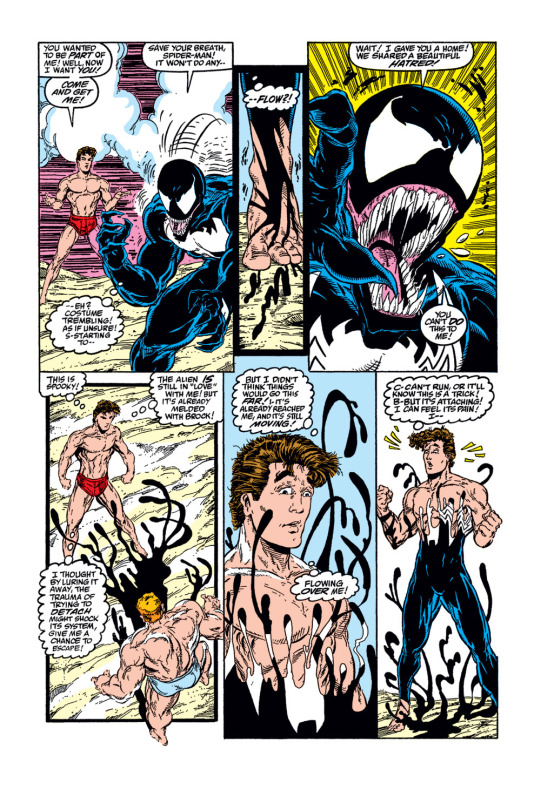
Bruce Banner/the Hulk is a character who hinges upon psychological realism. The entire premise of the character is that he has disassociative identity disorder and that the famous green savage Hulk everyone knows is an expression of his traumatised inner child throwing a gamma fuelled temper tantrum.
Peter David, who has written MANY Spider-Man stories including the iconic ‘Death of Jean DeWolff’, literally wrote an issue that took place inside Bruce Banner’s mind and where his fragmented identity (Bruce banner, Green Hulk, Grey Hulk) is made whole; an issue outright called 'Honey I Shrunk the Hulk' (as in head shrink).
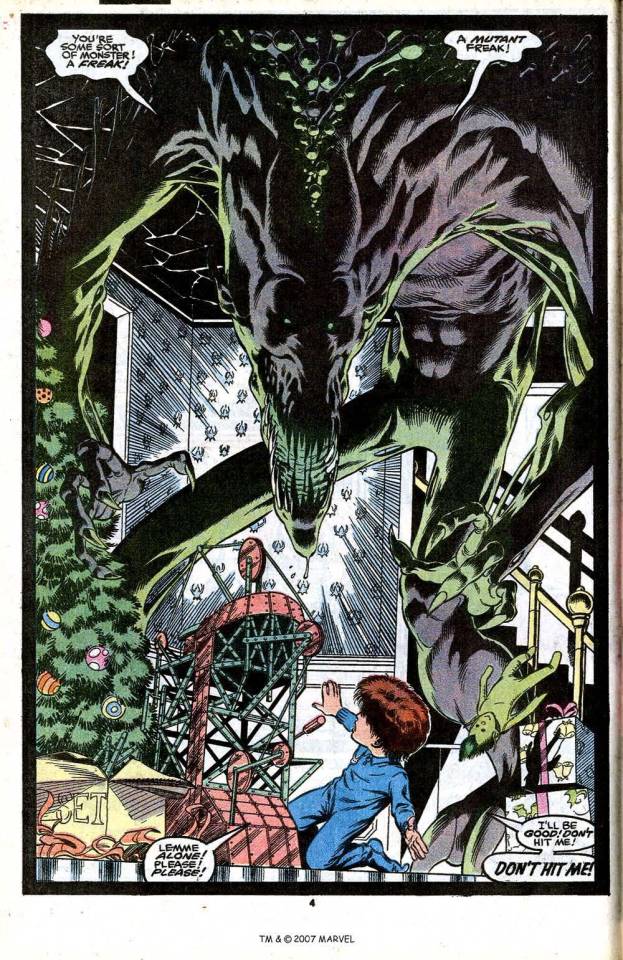
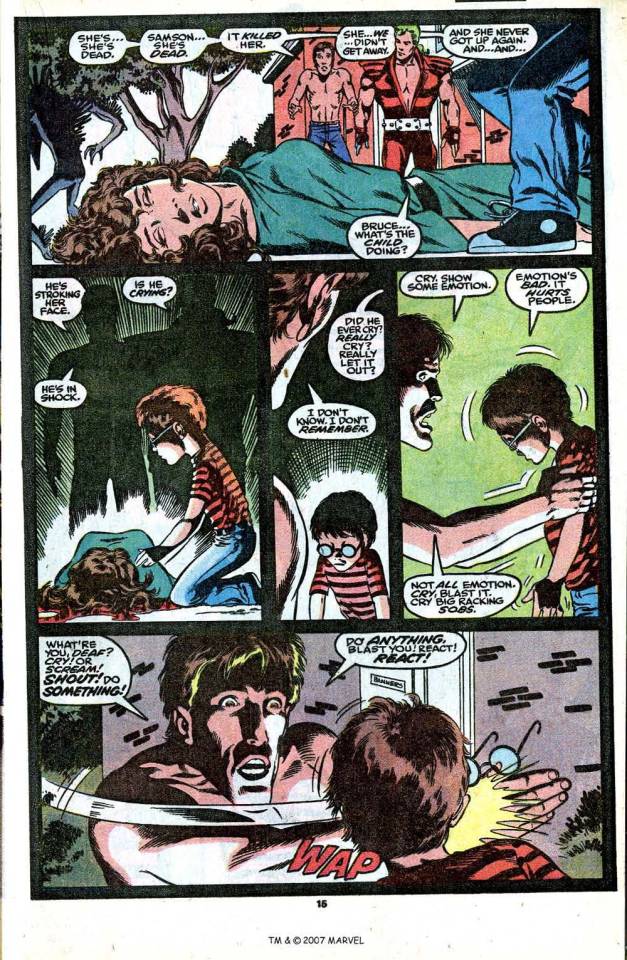

(Oh look, an abusive father who hit Bruce. Guess the Hulk's origin doesn't make sense and is shit now too).
PAD’s Hulk yarn wasn’t the only Marvel story in the 1990s that literally dives into the head of a fictional person (i.e. the most blatant example of trying to apply psychological realism to them). There was also two stories that did exactly that with symbiotic serial killer Carnage:
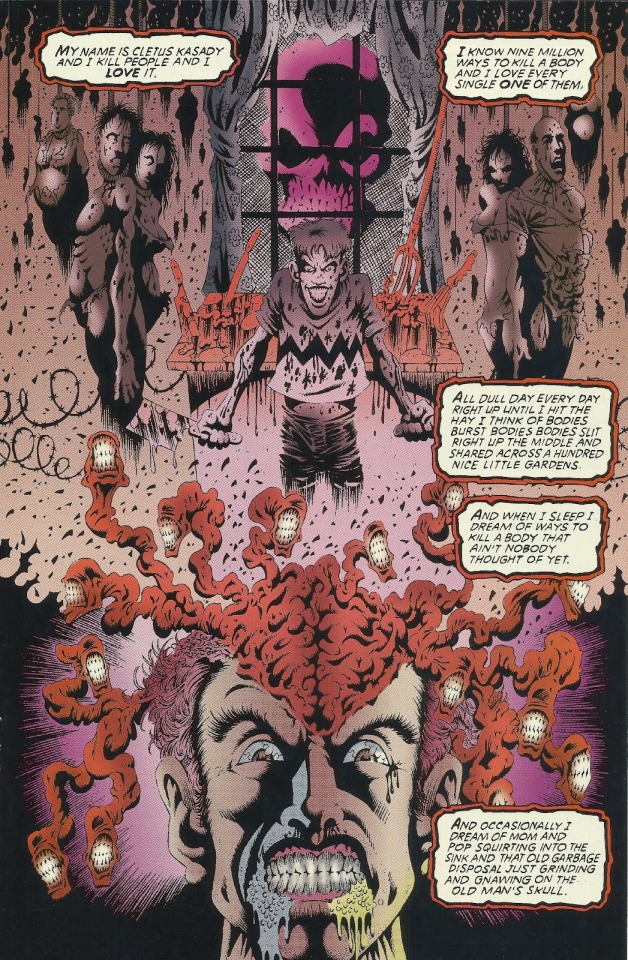
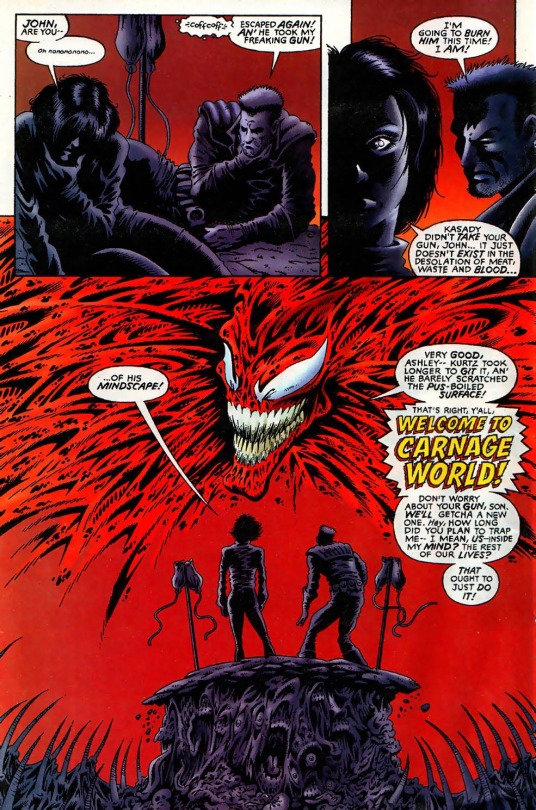
One of those characters was Dr Ashley Kafka, a psychologist supporting character introduced for Spider-Man stories.
Hmmm…why would Spider-Man comics introduce a psychologist as a supporting character? Well, there could be various uses for a character like that but perhaps one of them might be to offer realistic psychological insights into these fictional people. Fictional people like Venom.

Or Vermin.
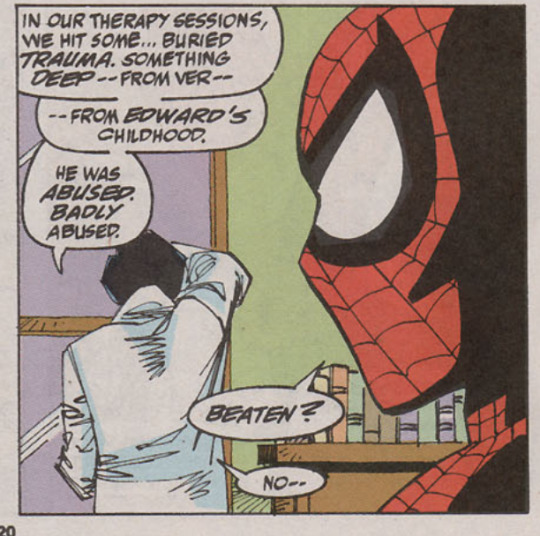

Or the Chameleon.
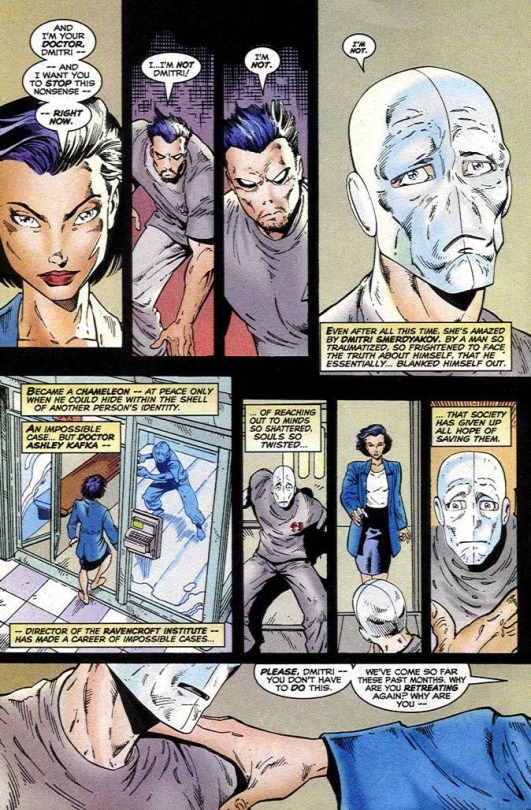
Hey, who created Ashley Kafka anyway?
It was prolific comic book writer J.M. DeMatteis. I wonder why he was so prolific, I mean what sort of stories has he done over at DC?
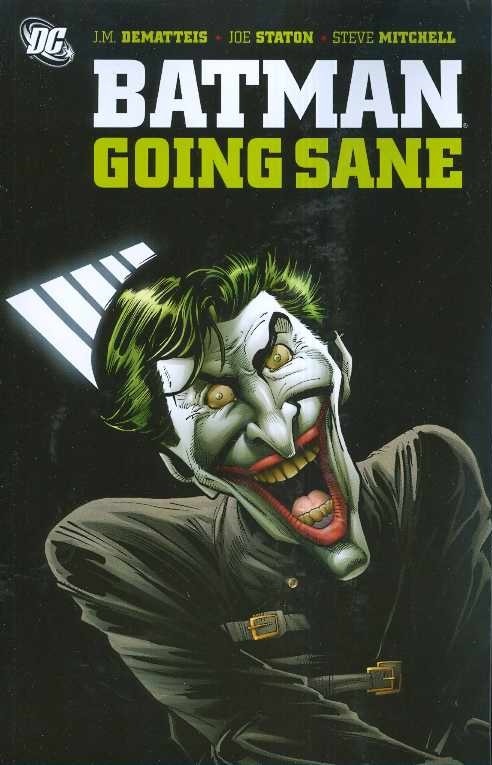
Oh…a story that acts as a psychological exploration of the Joker and his relationship to Batman. Fun fact, this story was originally rejects by DC because it was too similar to the Killing Joke…because it was also a psychological exploration of the Joker and his relationship to Batman.
Over at Marvel though, other than creating Ashley Kafka, what did J.M. DeMatteis write?
Oh, that’s right….
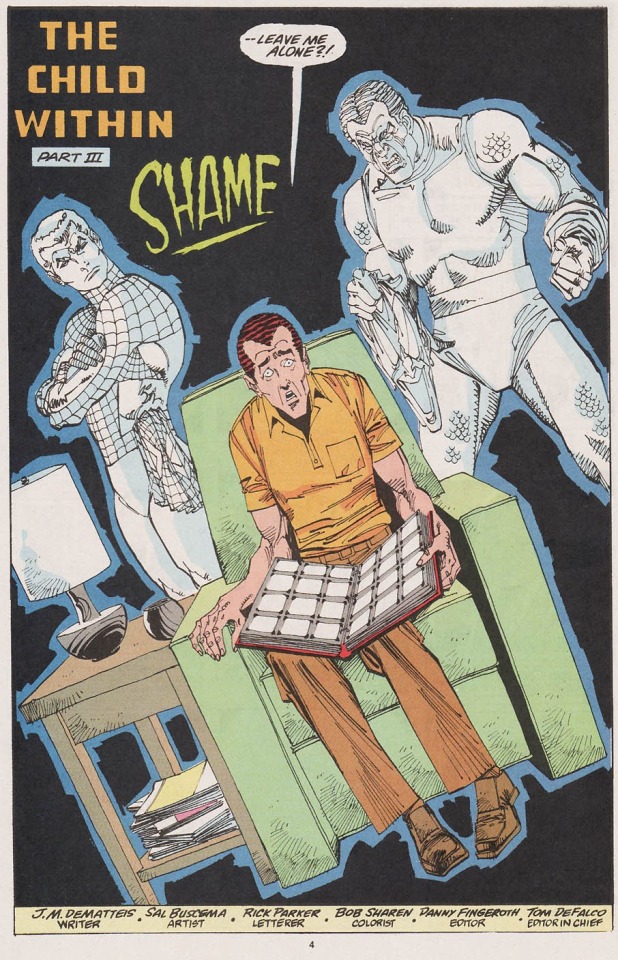
And...

And...
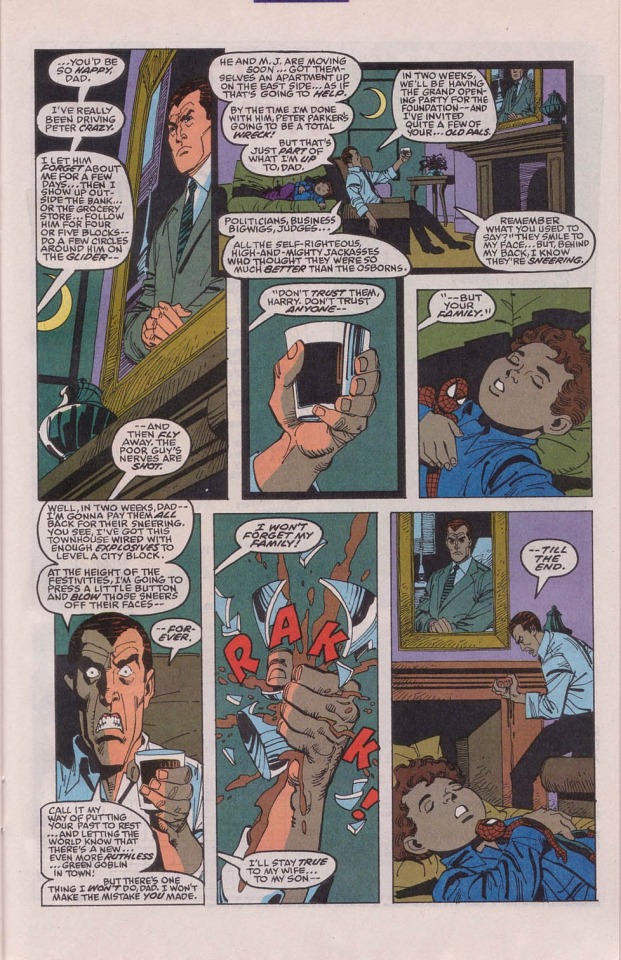
And...

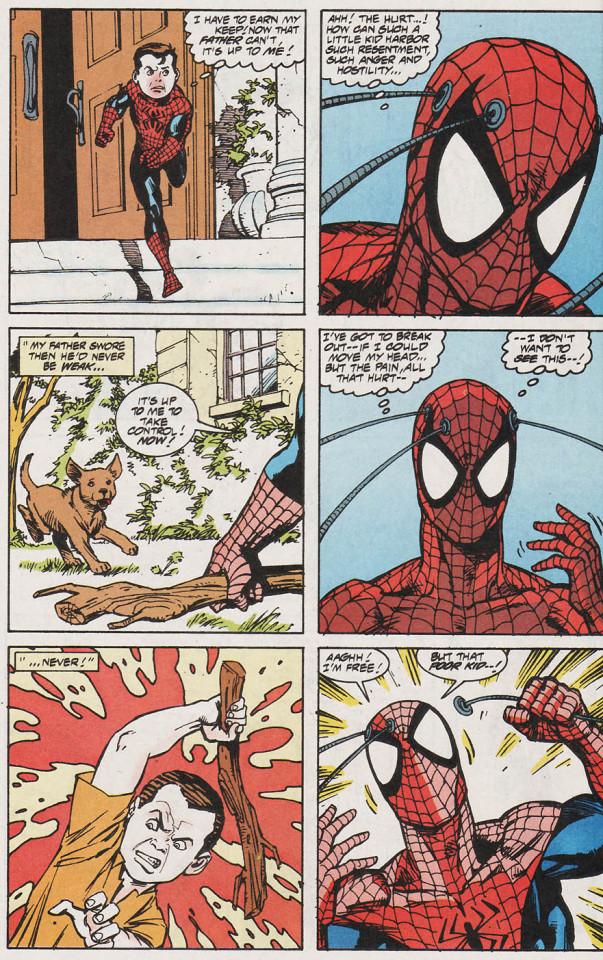

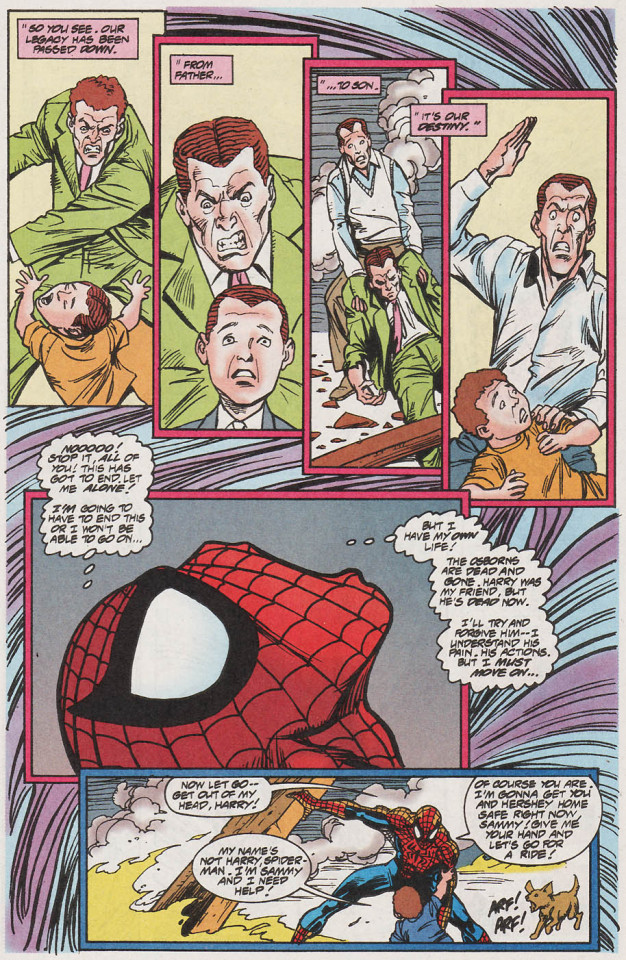
He wrote many of the stories we’ve been talking about this whole time. He was the guy who retconned the origin of Norman and Harry Osborn and explored Norman’s childhood in the first place.
Now it is a sad reality that there isn’t a single direct quote from DeMatteis proving he did in fact try to apply psychological realism when writing fictional people…
"We write about the things that obsess us. The themes in a writer’s work are the themes of a writer’s life. The Big Theme that has always obsessed me is the search for meaning, for personal, and cosmic, identity. Who are we? Why are we here? What’s the meaning of it all? Exploring those ideas, from both a psychological and spiritual perspective, is the driving force behind many of my stories, whether they’re more personal projects like Moonshadow or more popular ones like Spider-Man."
"I enjoy reading books about psychology and spirituality, books that explore the shadowed caverns of our psyches and the luminous castles of our souls."
"All the clever plotting in the world won’t help if it’s not grounded in psychologically real, relatable, characters."
"Peter Parker is one of the most psychologically and emotionally real characters in the history of comics"
"Harry and Peter are both very complex people, which meant that while the superhero action played out there was lots of room for psychological and emotional exploration."
…there are MULTIPLE direct quotes proving exactly that.
So YES we categorically should apply real life psychology to fictional people!
“ especially that nothing suggests in canon that his [Norman Osborn’s] dad was beating him to "feel powe[rful]”
I’ve said before and I will say it again, that is EXACTLY what is suggested by Spec Annual 1994 and Revenge of the Green Goblin.

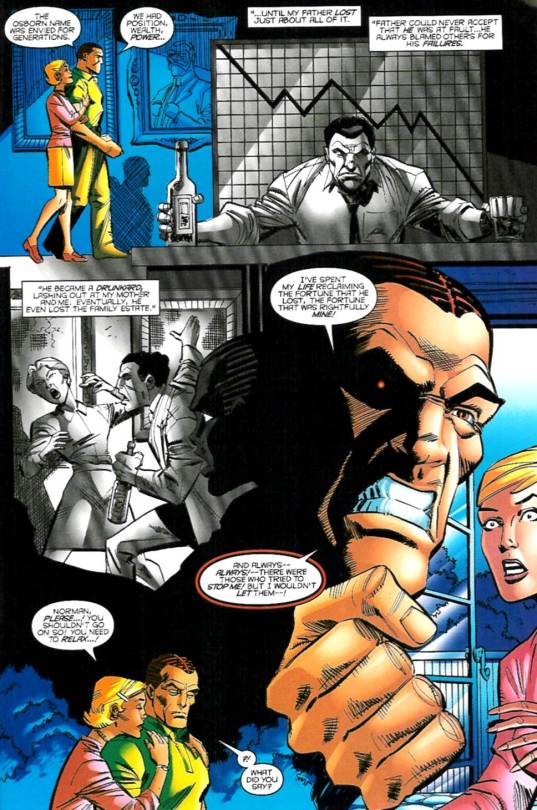
Norman's Dad loses the business and lashes at his son but this had NOTHING to do with him feeling powerless?
What do you think it means when someone feels powerless?
What do you think it means when someone of the old school tries to reaffirm that they are still 'a man'?
It is about power!
“All that's textually said is that he was lashing out on his family, in rage like many people irl when they lose everything.”
Yes but why would someone IRL lash out when they lose everything.
*gasp!*
You don’t possibly think they do that because losing everything makes them feel powerless and bullying someone else in turn makes them feel powerful, do you????????????? Feeling powerful couldn’t possibly be the root cause of why anyone bullies anyone else ever could it????????????????????????????????????????
Its almost like in textually saying he was lashing out because he lost everything it made him feel powerful or something?
Oh and by the way, ever so slightly undermined your own argument there. “We shouldn't apply real life psychology to fictional people,” vs. “…was lashing out on his family, in rage like many people irl when they lose everything.”
Which is it?
(not to mention if we aren’t supposed to apply real life psychology to fictional people why were you doing exactly that with your avatar examples?)
“Yeah the amnesia part never made any sense to begin with. It's said that the formula made him worse yet it doesn't seem to affect "amnesic" Norman all that much. Maybe it does? Because we don't see him all that much during his amnesia periods.”
We see PLENTY of Norman when he has amnesia.
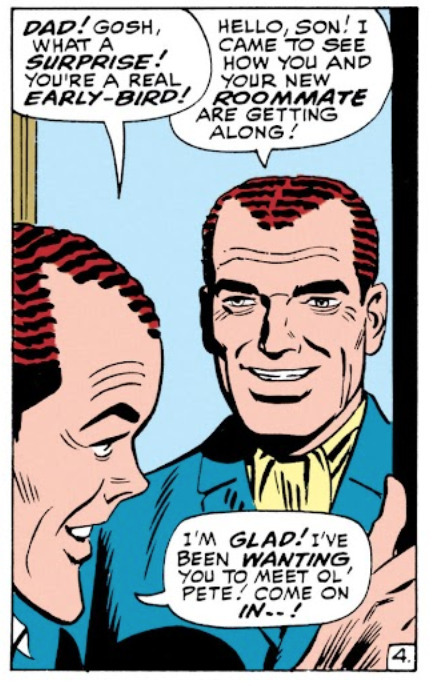

So no the formula does not affect norman when he has amnesia.
But an idea slightly suggested in ASM #40 and then eventually confirmed in Revenge of the Green goblin was that the formula made norman worse because in giving him powers it acted as proof he was superior to everyone else, in other words it sent him on a huge ego trip.

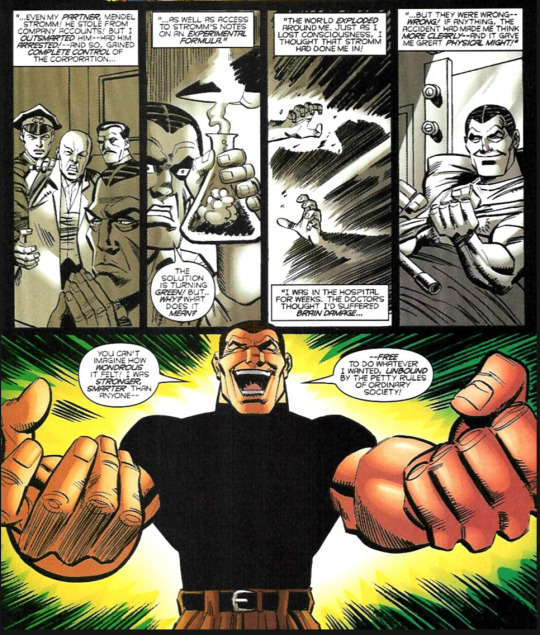
You know what would be interesting? If this Norman Osborn guy who is on a big ego/power trip formed a rivalry with a superhero who began his career on a big ego trip before being humbled. Especially if that hero’s defining philosophy was ‘with great power there must also come great responsibility…
“It honestly looks like a cheap excuse to keep him from telling the truth more than anything”
And as originally written by Stan, it was exactly that. It was taboo for a villain to know the hero’s identity back in the 1960s, or at least for them to go on living with that knowledge. Later stories however addressed this.
“But anyway, it just makes weird that his amnesia would make him a completely different guy if he was the same ashole during this specific time period he remembers (before Harry high school years).”
You haven’t been listening to me at all. You have never once addressed what I have said on this subject.
But I will repeat it again:
WE ARE THE PRODUCT OF OUR MEMORIES! IF YOU CHANGE THE MEMORIES YOU CHANGE THE PERSON!
You want a quick fictional example of this? The Arnie movie Total Recall.
In other words, the ONLY logical explanation for Norman becoming nice is because he DIDN’T just forget his memories after he became the Goblin. He forgot MORE than just that. Which is what happens with real life amnesia. You don’t just forget a set time period.
Yes the narrative has Spider-Man claim it is just everything after the accident that turned him into the Goblin, but how the fuck does Spider-Man know that for sure?
What we have is an objective flashback showing us exactly what Norman was like before the accident, we have objective on the page evidence of what he was like after the accident and we have objective on the page evidence of what he was like post amnesia. Post-accident is basically a bigger jerk of who he was pre-accident. Post-amensia is at odds with both versions.
The ONLY explanation that makes sense is that he didn’t simply forget the last few years, he forgot more than that. he forgot whatever life experiences shaped him into a bad person, or at least he couldn’t remember them clearly. Perhaps he could remember events but not the feelings associated with them.
This syncs up with how IRL amnesia works and reconciles everything, whether you look at the stories in the 1960s on their own or look beyond that decade.
“One could argue that he gradually became more and more neglectful. If Harry is just in denial as he can't see faults in his dad's parenting why did he spot a difference then? If his dad was acting the same as he always did, why would he be only in denial over how his dad acted prior to accident?”
Yeah MAYBE he did become more and more neglectful, but there is nothing on page suggesting that. We just know he WAS neglectful.
But alright, the idea that from Harry’s POV there was a time when things were better but got way worse before the accident, that could fit with the original story.
You know what else could fit just as well? That Harry is in denial. Because he wants/needs to believe at some point he and his Dad had a positive relationship when they actually never did.
Denial doesn’t work on the basis that it is 100% consistent all of the time. Norman was MUCH worse after the accident and Harry was also older and less impressionable and that change occurred within the last few years of his life circa ASM #39. All those factors combined make it entirely possible that he found it harder to deny that his Dad had changed. He’d gone from neglecting him and palming him off to almost entirely isolating himself and become more outspokenly verbally abusive and belittling.
Both were bad situations, but one was much worse.
Oh and be careful, because you almost sound like you are trying to apply real life psychology to counter my points. I thought we weren’t supposed to do that with fictional people?
“Why only complain about his dad's recent outbursts? It's clear that his dad is acting differently towards him. They had some good time together (despite his dad's obssesion over work) before the accident then his behavior towards Harry changed.”
No they didn’t. That’s the point of the story. They DIDN’T have good times together, but by the end of ASM #40 they now hopefully can have good times together.
The ASM #40 flashbacks are the deal breaker on all this. These aren’t simply flashbacks from Norman or Harry’s POV, these are from the omniscient POV as what they are depicting is not in line with what Norman is claiming. And they are not in line with what Harry was claiming in ASm #39 either.
Harry was NOT having a good time ever in those flashbacks and Norman was NOT being a good father.
Thing simply got WORSE after the accident.
Why is it so hard for you to buy into the idea that Harry is in denial?
Your approach is ‘Harry made this claim in a piece of dialogue therefore it MUST be completely true’. Even though the very next issue disproves it. Norman even says ‘I tried to be a pal to Harry’, he uses that exact word ‘pal’. And we see from those flashbacks that, no, he was not being a pal to Harry. He was being a shitty father. He was neglecting him, not talking to him, not engaging him or spending time with him.
So Norman is in denial and that was the point of the scene. BUT Harry, who has his DNA, couldn’t POSSIBLY be in denial also? There simply MUST be these magical phantom scenes we coincidentally never got to see where in fact they were BFFs?
Why is that more believable than ‘both father and son are mentally messed up’.
“Also bad person =/= bad father.”
That lacks nuance. You can be a good parent but in other ways a bad person, that is true.
But if you are a bad parent (specifically abusive, neglectful, putting yourself ahead of your child) you are as a matter of fact a bad person. There is nothing more important than raising a child.
“I'm just arguing about his parenting, not his morality,”
In this situation they are one and the same thing.
The things that make Norman a bad person are in turn what led to him being a bad father. He doesn’t have the ability to be a good father because he is a bad person.
During the Stan run, Norman pre-accident was also a bad parent and a bad person but to a lesser degree. That’s all there is to it. he railroaded his partner. He stole his innovations. He was after money and power. He neglected his son and priotised his pursuit of power ahead of his son’s wellbeing.
That is a BAD person, it just isn’t a total fucking monster which is what the retcons developed him into.
“we don't see much of him during his amnesia period to conclude that he was an all around a good person, just that he was a better dad.”
*pinches bridge of nose*
During his amnesia period (and excluding the period where he was in the process of remembering he was the Goblin) was Norman neglecting his son? No. Was he railroading his business partners? No. Was he stealing their inventions? No.
Oh, he WASN’T doing the things we saw him doing in the pre-flashbacks. But you know what he WAS doing? Being nice to his son. Spending time with his son. Making his son happy.
Hmmmm…its almost as if the things ASM #40 showed us about how pre-accident Norman was a bad person were either absent or directly the opposite with amnesiac Norman.
“But yeah, you're right, this amnesia plot device makes no sense no matter how you look at it but to me it looks like the implications is that his personality was reset before his accident. But to each their own, I guess .”
A story can imply one thing but show another or contradict itself. What is actually happening is more important than implications.
“I agree that Norman abusive background explains why he treats Harry so horribly as it was textually explained, as well as why he's so comfortable with his own darkness, his toxic masculinity but it doesn't explain as well why he became so obsessed with restoring his family's name, wealth, having social power.”
BECAUSE HIS DAD LOST THAT!
Do I actually need to explain that children are heavily influenced by their parents? That they subconsciously look to their parents as role models, that they seek their approval, that how their parents treats them shapes who they grow up to be?
If Norman’s Dad LOST the family’s prestige and was obviously upset about it and that in turn led to him hurting Norman OF COURSE Norman would want to restore it. He would have learned that prestige was important. Thus in restoring on some subcionsious level he’d:
Be making his father proud
Proving himself BETTER than the man who was his physical superior
Avoiding becoming like his father who he saw broken down and rendered weak by losing the company
Making himself powerful and therefore not weak, not like his father who was rendered weak/the helpless weak little boy his father bullied
“It's not about real life psychology, it's all about WRITING.”
THOSE AMOUNT TO THE SAME THING!
You can’t BE a good character writing without applying real life psychology! Because to be a good character writer you NEED to make your characters psychologically convincing, otherwise nobody would buy into them.
See above when I disproved your bullshit about not applying psychology to fiction.
You don’t NEED to have a psychology degree to write good characters but you do NEED to be able to get inside a fictional person’s head and render them as believable. And that would entail making them psychologically realistic.
William Shakespeare never studied psychology. He literally couldn’t have. But he was nevertheless able to write psychologically convincing characters that we CAN successfully apply real life psychology to.
Because writers and psychologists have this gigantic overlap in their respective fields, namely, getting inside people’s heads!
“Writing a proper Freudian excuse that doesn't require ton of meta analysis, real life psychology, conjecture.”
THERE IS NO CONJECTURE! The narrative SPELLS this all out explictely!
“And I'm not denying that it might be one of the factors, but it unlike his abuse of his own son, it's not used explain why he became so fixated on restoring his family's name,”
If Norman’s Dad abused him because the family business was fucked there would obviously be an inherent link between restoring the family business and the abuse he suffered.
This isn’t a Freudian excuse, it is basic bitch literary analysis. High schoolers could grasp this.
Norman didn’t want to be weak as he was when his dad hurt him. Norman didn’t want to be weak as his father was upon losing the business. His dad hurt him because he was upset about losing the business.
Therefore, in hitting Norman, in abusing him, it acted as a powerful motivator later in life to restore the family business.
It. Is. All. There.
“obtaining social power (not just physical) expanding the Osborn legacy”
You need to understand this, not just for the sake of this argument nor for your future reading of fiction, but just plain old navigating through life itself.
Power is power.
If you are made to feel physically powerless you 100% could go on to seek social power.
If a boss makes someone feel powerless at work they could leave work and make themselves feel sexually powerful by having sex with a hooker who they ask to call them ‘boss’ in the bedroom.
If your business is failing and your money is running out so you feel financially powerless and are losing social power there is a strong possibility that you’d hit your own child to feel powerful! Just as Norman’s Dad did.
You keep belligerently REJECTING the idea that there can be a link between social power and physical power but that is the truth of the matter. Not only have I known this for years through, you know, common sense, not only have I read up about this, but just to make 100% certain I am not wrong on this I asked someone I know personally who is a professional psychologist. She confirmed exactly what I’ve been saying.
Norman’s situation is entirely realistic. Which again, is no surprise, since it was written by a DeMatteis who was heavily into psychology and was himself friends with a professional psychologist who he based Ashley Kafka upon.
Oh, but I forgot, we don’t apply IRL psychology to fictional people right? But…if we aren’t doing that…why are YOU insisting that there can be no link between social and physical power??????????????????????????
And furthermore, expanding the Osborn legacy? Yeah, powerful people have wanted to insure they have a legacy to live on after they die since time began. That hasn’t even got anything to do with abuse or psychology. That is just how most animals are wired. We want our offspring to survive us and thrive. For Norman that meant his son and company would be strong
“, why he's a psychopath who loves killing people when we he doesn't get any benefit from it (like this guard's wife) .”
*groans*
He likes killing people because it is an exercise of his power. He is a power addict. He wants more and more power and wants to use it. No one takes power and DOESN’T use it.
Killing people makes him feel powerful.
He wants to feel that way because as a child he was made to feel powerless and saw his dad lose his power.
It is as simple as that.
And you seem to be ASKING for a psychological explanation there? I thought we don’t apply that to fictional people?
Why are you asking why someone is a PSYCHOpath but reject the PSYCHOlogical explanations I’ve been providing for it?
“It doesn't automatically explain IT ALL.”
It literally does. You are just being blind to that reality.
“It's not expanded on.”
There were 3 stories exploring it across nearly 10 years.
That expands upon it pretty well.
“It's not used to explain HOW it shaped his view on power, how it shaped his ruthless and psychopathic, personality (well unless you claim it's unborn ).”
I’m so exhausted at this point. It HAS been used to explain it. It explained it blindingly obviously. I have repeated it multiple times in this post let alone all the other ones I have made during this argument.
I have to ask now if you are trolling or if you are honestly just this blind?
And, again….asking for HOW something shaped someone’s view on power, HOW it shaped their personality? Gosh…that sounds like you are asking for a psychological explanation…but one where we cannot apply real life psychology apparently.
“I just wished that this backstory was more expanded on to show HOW it shaped him”
You literally admitted you haven’t read all the stories I mentioned so how can you possibly complain about all that.
You are complaining that something wasn’t explained when
It was explained IN Revenge of the Green Goblin
RotGG itself was an expansion of Spec Annual 1994, which you said you hadn’t read
“Like, there's so much things going on with him and the authors did the minimum they could,”
They wrote THREE stories exploring Norman and Harry’s childhoods and how those shaped them!
Roger Stern.
J.M. DeMatteis.
Paul Jenkins
Howard Mackie.
FOUR people between 1993-2000 wrote THREE different stories exploring this subject and this is the ‘minimum they could’?
Fucking Hell, what more do you want?
“as if we as readers are automatically supposed to connect all dots just from the knowledge alone that his dad beat him up and that it made him feel weak, so viewed toxic masculinity as "strength" and that it made him accept his own darkness.”
The. Story. Literally. Spells. This. Out!
Go. Read. The. Above. Pages!
But also, I, as a TEN YEAR OLD, understood this from Revenge of the Green Goblin alone. I didn’t even need the Child Within or Spec Annual 1994 to GET it!
It was REALLY obvious.
I’m not saying it should have been subtle…but also it was absolutely NEVER subtle.
To say readers are supposed to automatically connect the dots is saying ‘I have REALLY limited reading comprehension skills and need to be spoon-fed info.’
“Just how are we supposed to expand it to explain his psychopathy, his obsession with restoring his family's legacy which is primary motivation for most of what he does that's not connected to Peter (like the Gathering of five).”
See above. I’ve explained how it is all connected. Better yet read the stories. Though I doubt in this case it will make much difference.
“ This is made even more confusing with Sinister war”
A post-OMD story making things confusing? The shock I have. Its almost as if there was a reason I cut off with 2007
“Not to mention, that most of his much more prevalent roles happen post OMD compared to pre OMD which you entirely reject.”
No they don’t.
His most prevalent roles are his roles as a Spider-Man villain. Most of his appearances as a Spider-Man villain are PRE-OMD to my knowledge.
“Is his backstory still supposed to explain why he acts the way he does post OMD even though you said it made him a different character,”
It is irrelevant to this argument because I was never talking from a post-OMD POV to begin with.
But frankly, if post-OMD Spider-Man was well written (which it isn’t) yes his backstory SHOULD explain whatever he does. Or, more accurately, whatever he does should be written to be consistent with his established backstory in the first place.
The major reason I reject post-OMD is precisely because whether it is Norman, Harry, Venom, Doc Ock, Black Cat, J. Jonah Jameson, Aunt May, Mary Jane or Peter Parker himself, the stories are rarely consistent with their pre-OMD characterisations, whether that’s their backstories or simply older stories they appeared in. Peter doesn’t act like Peter. Mary Jane doesn’t act like Mary Jane. Harry doesn’t act like Harry. And Norman doesn’t act like Norman.
Peter wouldn’t become a paparazzi photographer.
Mary Jane would never break up with him because aunt anna’s life was endangered.
Jameson would never accept Peter upon learning he is Spider-Man.
Black Cat would never want Peter to be her fuck buddy and nothing more.
Doc Ock would never try to rape mary jane.
Harry would never be blasé about not remembering his own son Normie.
Aunt may would never blame peter for abandoning her the night uncle ben died.
These are merely one example for the above characters but you get my point.
If the characters aren’t behaving the way they should be in the context of the situation they functionally are not the characters anymore. And since the characters are the entire point of why we read Spider-Man in the first place, why the fuck should you, me, or anyone factor them into our analysis of those characters? Especially since, last I checked, OMD established that we are literally in a different timeline altogether, one where Peter and MJ never got married, where MJ was never pregnant but somehow, magically, despite this making 0 sense, every 1987-2007 Spider-Man story happened exactly the same way.
“even though it gave another explanation that I won't spoil you (read Sinister war) ?”
In other words Sinister War is bullshit. The new story is obliged to fit with the older one. In other words, if Sinister war has contradicted the origin and the origin doesn’t explain what he does in sinister war, it means sinister war is at fault not the other way around.
Norman in Sinister War SHOULD have been written in sync with his established origin.
“Also Otto was evil even before his ex fiancee died,”
Yes he was, but he WASN’T evil before they broke up. They broke up, he later became Doc Ock and later still she died. I never said otherwise. I said his MOTHER died.
“it only solidified his rivalry with Spider man as he wanted to prove that he's superior foe than Green Goblin.”
Not as originally written he wasn’t. His ex-fiance’s death was originally just AIDs, the idea that Norman infected her with AIDs was a retcon made 20 years later. As originally conceived Norman and Otto had never met face to face before Norman returned in 1996.
But that’s a big tangent that has nothing to do with my point, which was that in one issue it was established that Doc Ock became a villain due to MULTIPLE factors shaping him, not just one thing.
You never addressed my point.
“(Freudian excuse is basically a backstory that's supposed to explain how it shaped a villainous character. Don't know if it's an academic term but It's the term used by tv tropes)”
Then I am complete confusion.
You want an explanation for why Norman is the way he is…but ANY explanation by definition would be a Freudian excuse which is bad????????
But also we cannot use real life psychology?
The only thing I can conclude is you want a reason for Norman being evil that doesn’t involve his Dad hitting him even though in this specific case HOW that shaped him to be evil and twisted his world view is very clearly laid out.
It is just YOU who can’t see it.
But I am not surprised by this if you are also so insistent that we shouldn’t apply real life psychology to fictional characters. Frankly, that alone is a fucking joke of a take
"Norman hating spider man for his amnesia was never expanded on before or after this one throwaway line , that's what I'm saying. His hatred in other comics is never tied to it, directly or indirectly"
That.
Doesn't.
MATTER!
Him saying it ONCE is enough for us to confirm that it IS one of the reasons he hates Spider-Man. And it wasn't even a throwaway line either!
It was him explaining WHY he hates Spider-Man? In a story that was planned to be important, though no one knew HOW important it would go on to become. That is NOT a throwaway line. YOU think it is a throaway line but it is not actually a throwaway line.
You know what line was also only uttered ONCE for over 15 years worth of Spider-Man comic books?
"With Great Power there must also come Great Responsibility"
The most famous line of piece of writing in Spider-Man history, the line that is the defining philosophy of Spider-Man and his universe, was mentioned ONCE at the end of his first appearance in 1962 and was never repeated again until the late 1970s.
So, was THAT just a throwaway line?
Should we discount that as a motivation for Peter Parker?
Why does a line need to be REPEATED or EXPANDED upon to be relevant?
If it was said the once and so long as it doesn't contradict anything else, then it COUNTS. Deal with it.
20 notes
·
View notes
Text
Yang's Jungian Archetypes

This is a follow-up and a correction to this meta and it references this analysis by @hamliet, as well. Long story short, I am writing a suuuuper long Yang post (wonderfully complex girl) and I gathered some thoughts on how Jungian symbolism is used in her case.
JUNGIAN ARCHETYPES AND RWBY
Jungian archetypes are universal ideas that can be found in stories and culture worldwide (according to Jung anyway). Think about tropes like The Hero, the Helper, the Inner Child, the Anima and the Shadow. They are all archetypes.
Now, Jung found several of this universal tropes. To avoid making things more complicated than what they are, let's say that for this meta we need only 2 sets of archetypes (most of which overlap):
The 4 main archetypes that should describe how human psychology and society work. They are the Shadow, the Anima, the Persona and the Self.
The 4 archetypes Jung links to the alchemical process (yep, Jung was a nerd). Jung sees alchemy (the creation of the philosopher stone) as a metaphor for self-individualization and associates an archetype to each phase of the alchemical process. They are the Black phase (the Shadow), the White phase (the Anima), the Yellow phase (the Wise Woman) and the Red phase (the Self).
You can already see 2 things. First of all, the 4 phases of alchemy are called after the same colors of the RWBY girls. This is not by chance: RWBY is an alchemical story and makes use of alchemical motifs, as @hamliet explains here. So, each girl embodies a phase and all together they make the philosopher stone (RWBY aka ruby lol). Secondly, the archetypes are almost the same with one exception: the Persona is different from the Wise Woman.
Now, RWBY is a very Jungian story (as many stories are) and uses Jungian archetypes a lot. Specifically, each girl embodies a different archetype and this is true both when it comes to the 4 most famous tropes and to the 4 alchemical ones. In the first meta linked, I associated each girl to one of the 4 main archetypes (Shadow, Persona, Anima and Self), but I was wrong, so here comes the correct version:
Blake is the Shadow (obvs): she represents the Black Phase, her Semblance is called Shadow, her Theme Song is From Shadows and the Inner Beast is another name of this archetype. The Shadow is everything that a person hides or represses, both positive and negative. It fits Blake who is pushed in the darkness of society and whose arc is about learning to take the spotlight when needed.
Weiss is the Anima/Animus: the Anima/Animus is the masculine and the feminine and what is Weiss's main motif? Yep, Queen and Knight. This idea is developed throughout the evolution of Weiss's summons. The Knight is the Animus that completes her Anima. When they fight side by side they seem a Queen and a Warrior in battle together. The Queen Lancer is the integration between Anima and Animus: a queen and a lancer (a kind of knight). This also fits with Weiss being the White Phase of course. Psychologically, integrating the Anima/Animus means finding balance, which is Weiss's goal: for her heart and mind to be One.
Ruby is the Self: the Self is the sum of all the other archetypes and it represents the person as a whole. Ruby's Red Like Roses is a song that includes all the other girls and all the girls together make RWBY (Ruby). It works perfectly with our Little Red Riding Hood being the Red Phase as well.
What about Yang? In her case, the Persona and the Wise Woman do not overlap. However, our Yellow Beauty finds a way to fit both archetypes.
YANG AS THE PERSONA

The Persona is whatever is projected outside for others to see. It is the mask we wear in social interactions and generically everything that is in the light. Because of this, it is considered the opposite of the Shadow.
Does it fit Yang? I think so for 3 reasons.
-Yang has a light motif. Her name means Sunny Little Dragon, she is the only girl associated with the Sun instead of the Moon and she references the Light in the Yin Yang symbolism.
-It fits her complementarity with Blake. Blake is the Shadow, while Yang the Persona. Blake must show herself more and come into the light, while Yang must face her inner shadows. The climax of the Mistral Arc makes this foiling obvious.
Blake is on the surface and in charge of an army (aka a public figure). Her defining scene in the Battle of Haven is her dragging the true Adam into the light:
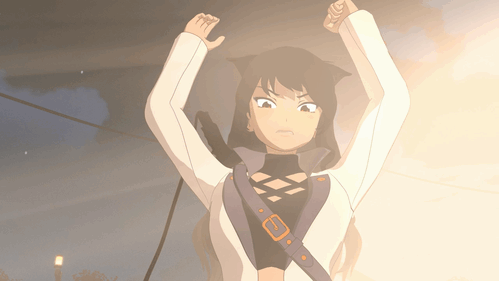
And everything happens in front of a crowd.
Yang is instead underground and hidden from everyone else. Her climatic scene is an emotional discussion with her mother where she faces her internal turmoil, hurt and vulnerability. By the end of it, nobody knows what happened, but Yang herself.
-Even if counter-intuitive, it actually fits Yang psychologically as well. On the surface, Yang appears as this confident extrovert girl that wears everything on her sleeve. Still, she is one of the characters that represses the most.
You know, once I read a comment somewhere that stated how all the other girls have these deep songs that comment their interiority and journeys, while Yang's music is about how awesome she is :''') Well, I doubt this is by chance: Yang tells us very little about herself in her songs, doesn't she? She presents this image of strength and confidence, but it is obvious she is an incredibly deep character with a rich inner journey. However, it does not emerge in her music. She wears a mask, while singing. She wears a Persona.
And yet, I Burn states it pretty clearly:
Come at me
And you'll see
I'm more than meets the eye
Yang is not what she seems and behind her Persona (the Himbo :P) there is a completely different archetype: the Wise Woman.
YANG AS THE WISE WOMAN

The Yellow Trailer - I Burn gives us a hint of what the Wise Woman stands for in Jungian psychology:
The unconscious changes its dominant character and appears in a new symbolic form representing the Self, the innermost nucleus of the personality. In the dreams of a woman this centre is usually personified as a superior female figure – a priestess, sorceress, earth mother, or goddess of nature or love.
The Wise Woman is a first unconscious representation of the Self, so Yang's song in the trailer contains all the other girls'. Wait, wasn't Ruby the one representing the Self? She is, but Ruby and Yang are interconnected when it comes to alchemical symbolism. As a matter of fact, the Yellow Phase is often considered a part of the Red Phase. In RWBY this connection is solved by making Yang and Ruby sisters. In a sense, they share their major conflict (Summer's disappearence and the effect it had on the 2 girls). At the same time, the Yellow Phase and the Red Phase are not exactly the same, just like the Wise Woman and the Self. The Yellow is a stage that leads to the Red, which is the end of the journey. Similarly, the Wise Woman is a very first glance at one's Self. It is a first step into individuation.
Specifically, the Wise Woman is the overcoming of the mother that comes with self-awareness, so Knowledge. It clearly fits Yang whose whole arc is about dealing with her 2 moms and searching for answers:
Yang: To this day, I still want to know what happened to my mother and why she left me.
However, there is more. Jung discusses how every archetype has a negative and a positive side. Think about Tarot Cards and how the same card can mean good or bad things. Archetypes are the same. When it comes to the Wise Woman, Jung defines it in 2 ways.
On the one hand the Wise Woman has her counterpart in the figure of the witch, or as the psychologist calls her "the terrible mother".
On the other hand there is this:
"the sky-woman is the positive, the bear the negative aspect of the 'supraordinate personality', which extends the conscious human being upwards into the celestial and downwards into the animal regions."
The Wise Woman/Terrible Mother and the Sky Woman/Bear imagery fits respectively Raven and Yang.
WISE WOMAN/TERRIBLE MOTHER VS SKY WOMAN/BEAR
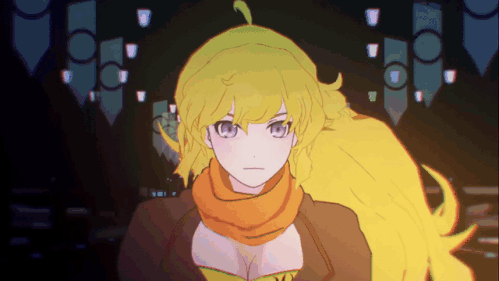
Raven is both the Wise Woman and the Terrible Mother. She offers answers and has information nobody else knows. Still, she is also a bad mother, who abandoned her new born daughter and has no problems using Yang as bait for her own sake.
Yang is the Sky Woman. A dragon that soars:
I've found the strength to grow so much more
A whisper to a roar
No more crying
It's time for me to soar
She is also the Bear, though. Her Goldilocks allusion presents her as both Goldilocks and the Junior Bear, which is why her outfits are all brown. Not to mention how she keeps fighting Ursai and that in her trailer she defeats Snowhite and Red Rose (the Malachite Twins).
The twins' fairy tale speaks of 2 sisters that befriend a Bear (Junior), who is eventually revealed to be a Golden Prince. Yang enters the Malachites' story and conquers it by taking central stage. She herself plays the part of the Golden Prince who defeats her Bear part (her curse).
In short, Yang is caught between the sky (the dragon) and the earth (the bear), just like Raven has traits of both the Wise Woman and the Terrible Mother.
Both women are struggling with their positive and negative traits. Which one will "reach the celestial" and which one will be stuck in the "animal regions"?
The answer comes with their confrontation in the battle of Haven. Their "fight" is after all about deciding who is the real Maiden of Knowledge (Maiden of Haven) on a thematic level. In other words, who is the real Wise Woman (Sky Woman)?
The ending makes it clear:

Yang enters the vault and takes the relic, which means she finds Knowledge. She is the real Maiden symbolically speaking. She is the Woman of Haven and is wiser than her mother even with no powers.
Raven instead remains stuck in her animal form (she transforms into a raven) and runs away:
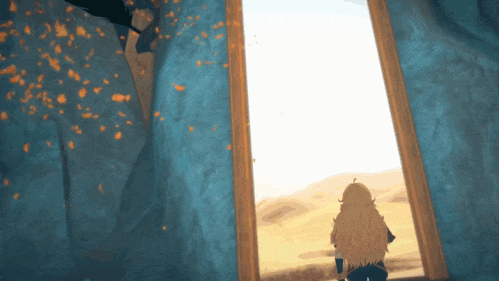
She cements herself as a Terrible Mother:
Yang: Because you're afraid of Salem!!! And if you thought having Maiden powers put a target on your back, imagine what she'll do when she finds out you have a Relic. She'll come after you with everything she has. Or she can come after me. And I'll be standing there, waiting for her.
(...)
Raven: I… I'm sorry…
When it comes to choose between her own safety and Yang's she can't bring herself to do the right choice.
In conclusion, the climax of the Mistral Arc is nothing, but Yang facing her own negative Archetype in Raven. She overcomes her mom and steps into the role of the Wise Woman, that she is still growing into.
99 notes
·
View notes
Note
as someone who doesn't go here, I'm really interested in all this arthuriana stuff, lol. So far what I know is that good pal Lancelot there is really head over heels for the very misunderstood red haired queen, Arthur is a questionable human and that Sir Gawain (and all his 150 other names) is a knight icon.
Oh, I'm not the right kind of Blogger to explain all these sorts of things. I tend to ramble and it becomes a kind of essay and I have to insert screenshots of specific texts. Not to mention the hassle of producing links to a source.
But yes, there's a lot of nuance that a casual read wouldn't really get if, say, you only read Le Morte D'Arthur and nothing else. Or worse, read up on only Modern works, like Idylls of the King or Once and Future King. The last two are Modern Stories to the core, often neglect important medieval contexts when it comes to the treatment of the legend. It would take an entire posts detailing the nitpicks I have towards them.
So to keep things short, here's a bullet point summary, that lacks a bit nuance itself but gets to the point and keeps it brief:
These characters have been written about for centuries. They've had different contradictory portrayals - sometimes even in the same story - depending on the cultural trends and motives of the storytellers. Arthuriana is a massive tradition with huge influence and to euclidate it all would be virtually impossible.
For instance, Sir Lancelot, as a character, is fundamentally the "Fantasy Boyfriend" archetype - he exists to be an idealized love interest wish-fulfillment for a female audience to fawn over (through Guinevere). Everything he does as warrior is done in the name of Love and is glorified for it. The sad thing about Lancelot is that he became outdated, with the cultural trend that created him - Courtly Love = having puttered out a long time ago. And as a result, he tends to get misconstrued by later interpretations.
Likewise, Queen Guinevere as has had many characterizations over centuries, from villain to heroine and everything in-between. She's misunderstood in the sense that most people don't know or acknowledge that the narratives surrounding Guinevere has changed, evolved and, more importantly, has accrued different and confusing plot points and themes - stuff that for their time made sense but aged poorly in retrospect. And that a lot of writers work from a limited pool of references (sticking to only 1 or 2 classics with all the strengths and flaws of those few stories) and insert contemporary biases in their retellings.
Also, Guinevere is not necessarily a Redhead. She is Blonde in Knight of the Cart.
King Arthur is... a Dark Ages Warlord. He would not exactly the nice man that gets hyped as an ideal leader, like Alfred Tennyson and T.H. White would have you believe. He has, throughout the evolution of the legend, character traits that don't exactly jive to the modern image of the character and has ambitions that would be tyrannical in our minds (Like his Campaign to conquer Europe or his Sexual Escapades)
Sir Gawain is the go-to action hero of the Romances. He can be said to be both an everyman and a stock character archetype - Gawain can be shoved in any story and in any role (heroic or villainous) and it would still make sense. The guy is versatile.
Even this Bulleted List doesn't cover everything I wanted to say. There's just simply so much to parse through and I'm not very good at organizing my thoughts in the spur of the moment.
I'll finish this post by saying keep digging and look up articles on medieval culture and history to give a little bit of context. From time-to-time, I also post about IRL Medieval Culture facts (like Law Codes).
There's so much more to learn about this (and possibly get disappointed in so many modern stories about the Arthurian Legend)
5 notes
·
View notes
Note
Good night, morning or afternoon! I hope you have a good day! I would like to ask how could Bulk evolve? What would it's hero suit be like? Thank you very much for your attention! This is without a doubt one of my favorite quirks and I wanted to see how he could be improved.
Out of all the Quirks I've made, I wouldn't expect someone to call "Bulk" one of their favorites. Still, I have talked about evolutions and applications before, so I'll focus on the costume.
If you are talking general style, that comes more down to the character. There are certainly plenty of tough guy archetypes to take inspiration from and what image they want to present, such as the powerful circus strong man or the tough as nails bancho. As for support equipment, that's a bit tougher. There is a problem support equipment could help with, that being the energy drain on their body. They could have various utility pouches to carry various foods or calorie supplements in order to keep the user's energy up. Otherwise, the user may just be too strong to handle a lot of it. However, one idea I liked is that the user could carry around Hyper Dense Tools, similar to the weights Sir Nighteye had. Because the user is so strong, they wouldn't be bothered too much by the extra weight, but could give them a lot of power. While they could feasibly have any tool they want, throwable ones like the seals would be especially useful for the extra range. They could then integrate them into the costume as well, like having bracers and kneepads made of them, in order to increase their striking power like Bakugou does. It could even work as a way to suppress the user's physical abilities as to keep themselves from hurting people. They could then remove these weights in order to go all out if they need to.
19 notes
·
View notes